50 I Believe Essay Topics
To better train students on how to present their personal opinions on subjective matters, teachers will assign what is known as an “I Believe” or “This I Believe” essay writing assignment.
Designed to provide the reader with insight into the writer’s character, these essays are typically written in first-person point of view. The writer shares their beliefs on a particular topic – ranging from religion and politics to more personal subjects such as love and happiness – and offers supporting arguments for why they hold these beliefs.

The Challenges of Writing “I Believe” Essays
This type of essay prompt is a welcome break from more detail-oriented or researched-based writing assignments for many students. However, “I believe” essay writing assignments aren’t always easy.
It can be challenging for students to articulate their beliefs in a clear and concise way that isn’t argumentative or offensive to the reader. Students may also struggle to explain their reasoning behind these beliefs in a thorough and not overly simplistic way.
Despite these challenges, “I believe” essays can be an excellent opportunity for students to share their thoughts and feelings on important topics and learn more about themselves in the process.
Tips for Writing “I Believe” Essays
If you’re given an “I believe” essay assignment, here are a few tips to help you get started:
- Start by defining what it is that you believe. This may seem like a simple task, but it can be challenging to identify your core beliefs. If you’re struggling, start by jotting down a list of topics that are important to you – from politics and religion to family and friendship.
- Reflect on why each topic is important to you. Think about the reasoning behind your choices and how these reasons evolved over time. After all, your core beliefs are likely to have changed or grown since you reached adolescence.
- Determine which of your beliefs are the most important. Focusing on developing thought processes that support your beliefs. For extra help, consider sharing these thoughts with a trusted friend or family member for advice.
By reflecting upon your core beliefs and developing clear arguments to support them, you can craft a powerful “I believe” essay that will truly reflect your thoughts and feelings.
How to Write an “I Believe” Essay
To craft a well-written “I Believe” essay, students must forgo the typical essay structure of introduction, body, and conclusion.
Instead, the essay should be organized around a series of specific beliefs that the writer wishes to share. Each thought should be introduced with a clear thesis statement, followed by supporting arguments and examples.
The conclusion of the essay should wrap up the main points that have been made and leave the reader with a final thought to ponder.
Here is an example of how an “I Believe” essay might be structured:
Thesis: I believe that everyone has the right to love and be loved.
Argument: Everyone deserves to find love and experience happiness in their lives. This should not be limited by race, religion, socioeconomic status, or any other factor.
Example: I saw a video of a man proposing to his girlfriend at Fenway Park. She said yes and the crowd went wild! Now that is love. If they can find it, then so can we all!
Conclusion: Society should not stand in the way of love. Love is the most powerful force in the world, and we should all embrace it.
As you can see, the “I Believe” essay structure allows for a great deal of flexibility. Students can choose to focus on a variety of topics and can organize their essays in different ways. An “I Believe” essay can be an excellent opportunity for students to present their thoughts on important issues under a few simple guidelines. With a bit of planning and organization, this type of essay writing assignment can be a breeze!
What You Shouldn’t Do When Writing an “I Believe” Essay
To ensure that you are writing an “I Believe” essay and not another form of an argumentative or persuasive essay, avoid doing the following:
- Don’t provide evidence or use statistics to support your position – this is not an essay that calls for research.
- Don’t attack or criticize the beliefs of others – your goal is to share your own opinions, not to tear down those of others.
- Don’t go off on tangents – stay focused on the main points you want to make.
- Don’t speak objectively or in the third person – for example, don’t say “people believe that” or “studies show.”
- Don’t use filler words and phrases such as “I think,” “I feel,” and “it seems like.”
Use any of these 50 “I Believe” essay topics to help you brainstorm ideas for your essay!
I Believe Essay Topics About Life
- I believe that life is too short to spend time with people who bring you down.
- I believe that laughter is the best medicine
- I believe that we should make time for quiet reflection every day.
- I believe that the only thing that matters in life is love.
- I believe that we are all capable of change.
- I believe that it is never too late to learn and grow.
- I believe in the power of positive thinking.
- I believe that we should always be kind, even when it is difficult.
- I believe that there is no such thing as a coincidence.
- I believe in the saying “what goes around, comes around.”
- I believe that we are all responsible for our own happiness.
- I believe that the best things in life are free.
- I believe that it is essential to be grateful for what we have.
- I believe that it is never too late to achieve our dreams.
- I believe that we should surround ourselves with people who make us better.
- I believe that you can either love or hate something; there is no in-between.
I Believe Essay Topics About Education & School
- I believe that education is the key to a bright future
- I believe that children are our future and should be treasured as such.
- I believe that there is no such thing as a dumb question.
- I believe that schools should do more to celebrate diversity.
- I believe that homework is essential, but it should not be excessive.
- I believe in the importance of having a strong support system while attending school.
- I believe that standardized tests are not an accurate measure of a student’s knowledge.
- I believe that it is vital to find a balance between work and play while in school.
- I believe that everyone should have the opportunity to learn how to swim.
- I believe in the importance of recess and physical activity in students’ lives.
- I believe that there is no such thing as a bad grade.
- I believe that teachers deserve more respect and better pay.
- I believe that it is never too early to learn a foreign language.
- I believe that education should be free for everyone.
I Believe Essay Topics About Friends & Family
- I believe that family is the most important thing in life.
- I believe that friends are the family we choose for ourselves.
- I believe that it is essential to maintain close relationships with friends and family.
- I believe that there is no substitute for quality time spent with loved ones.
- I believe that family is not defined by blood but by love and commitment.
- I believe that we should spend more time with the people we care about and less time worrying about material things.
- I believe that it is better to have a few close friends than many superficial ones.
- I believe that it is healthy for friends to grow apart.
- I believe that competition between friends is healthy.
I Believe Essay Topics About Money
- I believe that money cannot buy happiness.
- I believe that it is essential to be happy with what you have, not what you want.
- I believe that people are more important than things.
- I believe that it is okay to splurge on something even if it means going into debt.
- I believe that it is better to give than to receive.
- I believe that money can’t buy everything.
- I believe that the love of money is the root of all evil.
- I believe in saving for a rainy day.
- I believe in investing in oneself.
- I believe in the saying, “money doesn’t grow on trees.”
- I believe that rich people should be forced to pay more taxes.
These 50 I Believe essay topics are sure to inspire your own original beliefs and help you create a powerful and unique essay. When writing your I Believe essay, be sure to focus on the beliefs that are most important to you and that you feel passionate about discussing. The best I Believe essays are the ones that are personal and reflective, so don’t be afraid to share your own thoughts and experiences.
Related Posts
- 145 Informational Essay Topics
- 125 Reflective Essay Topics
- 150 Comparison Essay Topics
- How to Choose Research Paper Topic
- 200 Research Essay Topics
Categories:
- Essay Samples
- Essay Topics
- Essay Writing Guides
Recent posts:
- 170 Ethics Essay Topics
- 160 Satire Essay Topics
- 160 Rhetorical Essay Topics
- 155 Criminal Justice Essay Topics
- 150 Political Essay Topics
- 145 Classification Essay Topics
- 140 Sociology Essay Topics
- 140 Opinion Essay Topics
- 140 Environmental Essay Topics
- 135 Controversial Essay Topics
- 125 Classification and Division Essay Topics
- 120 Literary Essay Topics
- 100 Profile Essay Topics
- 90 Heart of Darkness Essay Topics
- 80 Holocaust Essay Topics
Testimonials


This I Believe Essay

In the realm of personal expression and introspection, the “This I Believe” essay stands as a testament to the power of individual beliefs and narratives. Rooted in the context of personal experiences and convictions, these essays provide a platform for individuals to articulate their core principles, values, and perspectives. Through the use of various literary devices and elements , authors craft narratives that illuminate their unique outlook on life. In this article, we will delve into the definition of a This I Believe essay, present a step-by-step guide on how to craft one, address common questions, and explore the essence of this expressive form.
1. High School This I Believe Essay Example
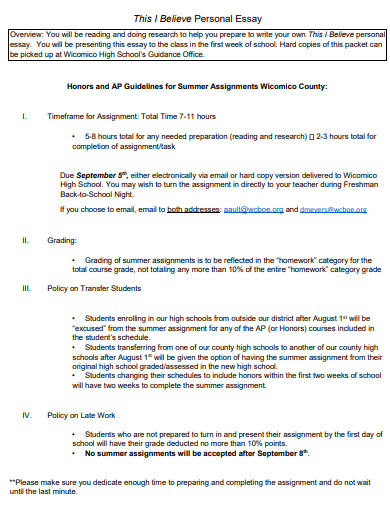
Size: 487 KB
2. Sample This I Believe Essay Example
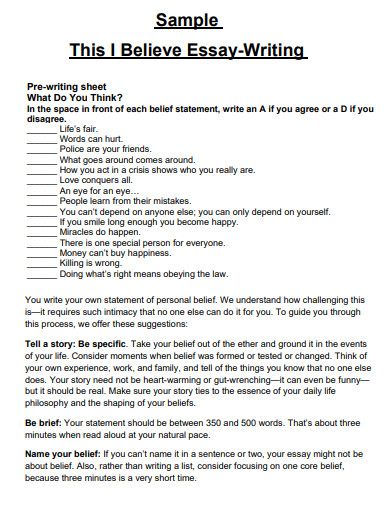
Size: 47 KB
3. Student This I Believe Essay Example
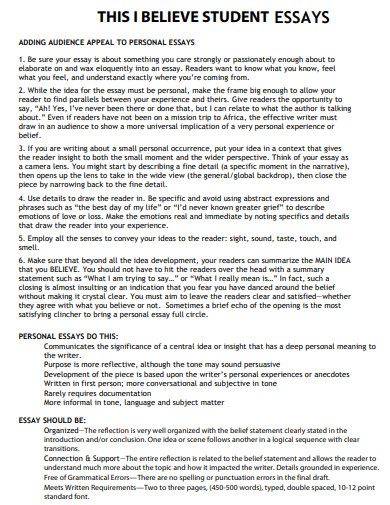
Size: 173 KB
4. Middle School This I Believe Essay Example
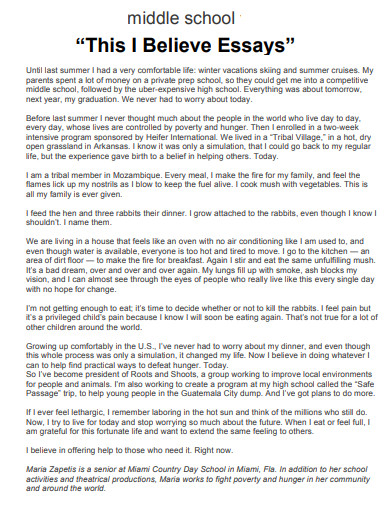
Size: 270 KB
5. This I Believe Essay Topic Example
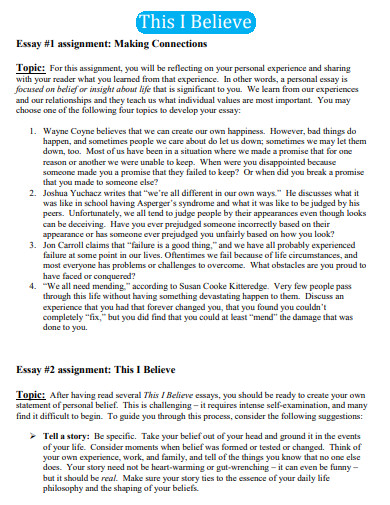
Size: 532 KB
6. This I Believe Essay Life Example
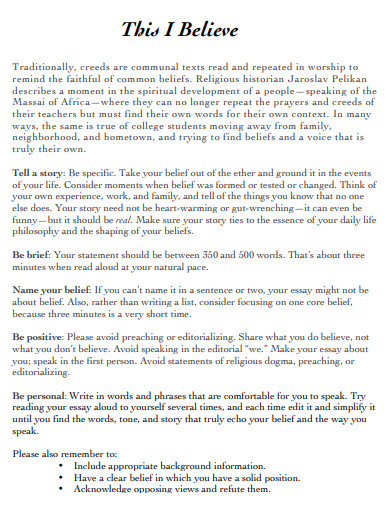
Size: 101 KB
7. This I Believe Essay Overview Example
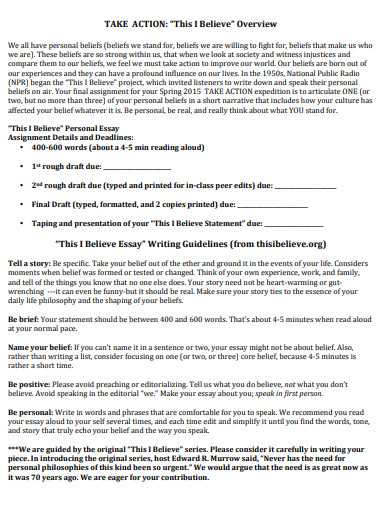
Size: 67 KB
8. This I Believe Essay Steps Example
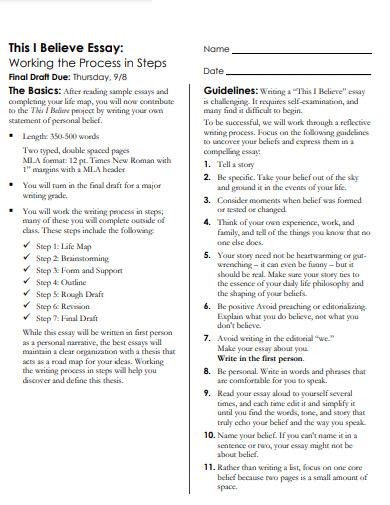
Size: 156 KB
9. This I Believe Essay Friendship Example
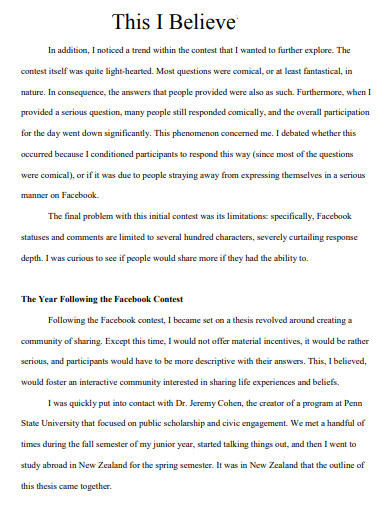
Size: 426 KB
10. Sports This I Believe Essay Example
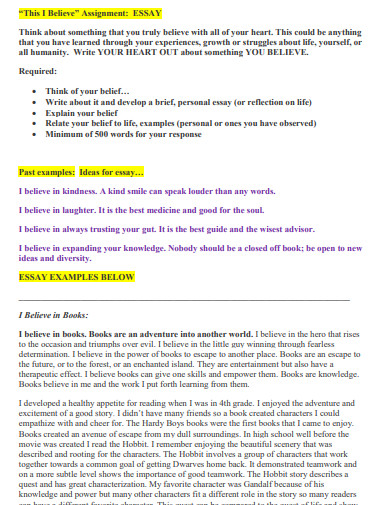
Size: 159 KB
11. This I Believe Essay Rubric Example
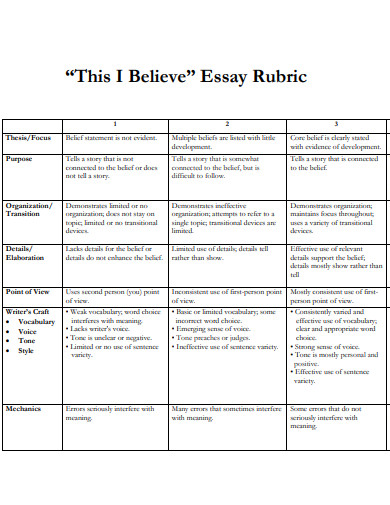
Size: 84 KB
12. This I Believe Personal Essay Example
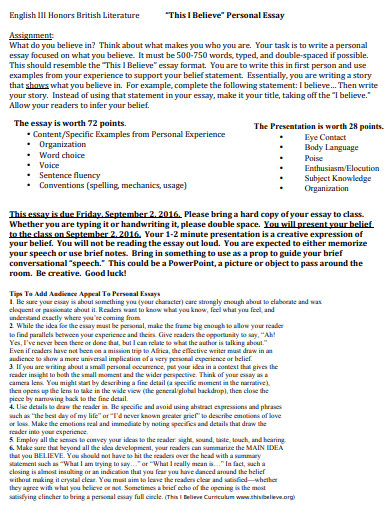
Size: 104 KB
13. This I Believe Essay Writing Example
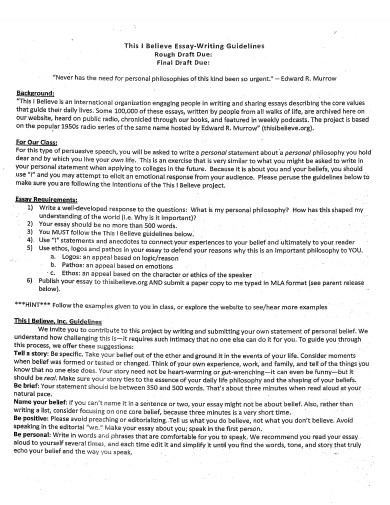
Size: 175 KB
14. This I Believe Essay Statement Example
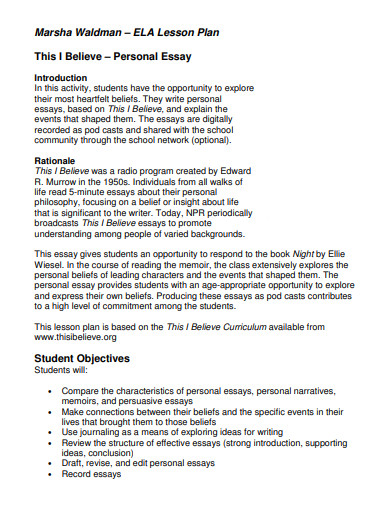
Size: 55 KB
15. God This I Believe Essay Example
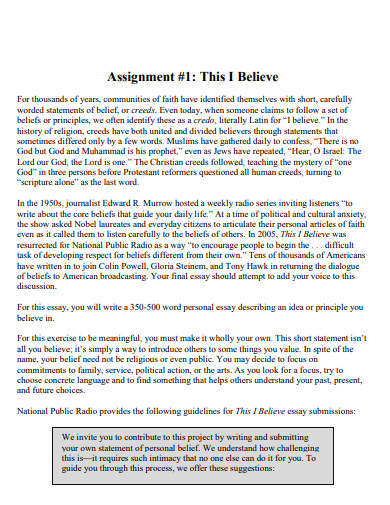
Size: 117 KB
16. This I Believe Essay Brief Example
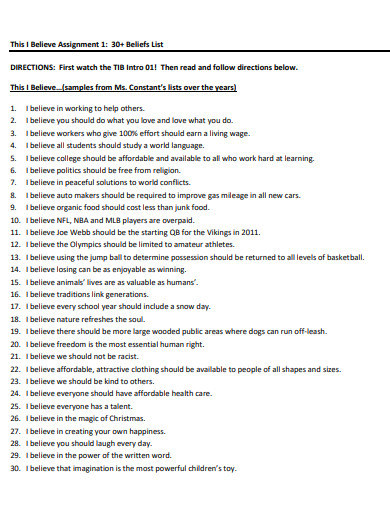
Size: 121 KB
17. This I Believe Essay Thesis Statement Example
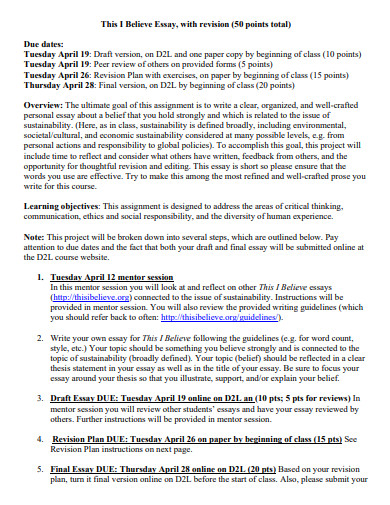
Size: 11 KB
18. This I Believe Essay Speech Example
19. this i believe essay college example.
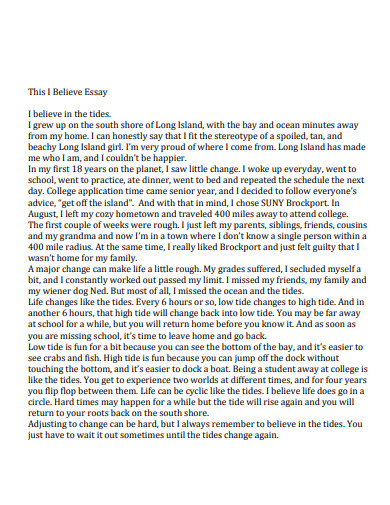
Size: 66 KB
20. This I Believe Essay Lesson Plan Example
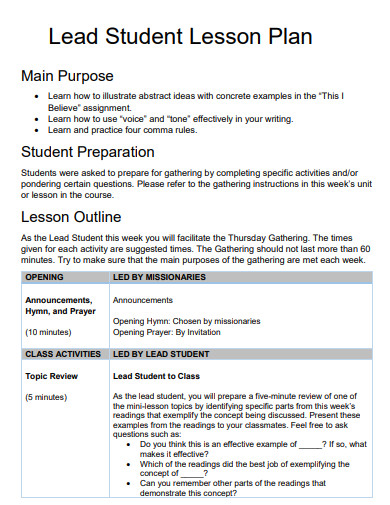
Size: 63 KB
21. This I Believe Essay Music Example
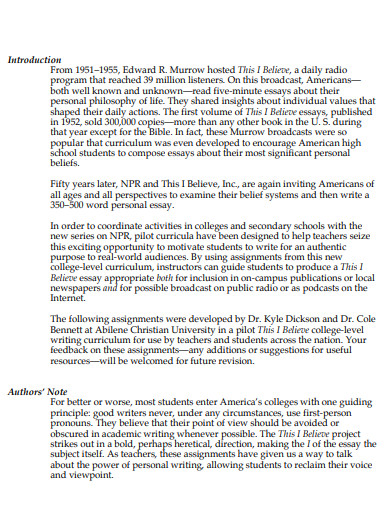
Size: 406 KB
22. Faith This I Believe Essay Example
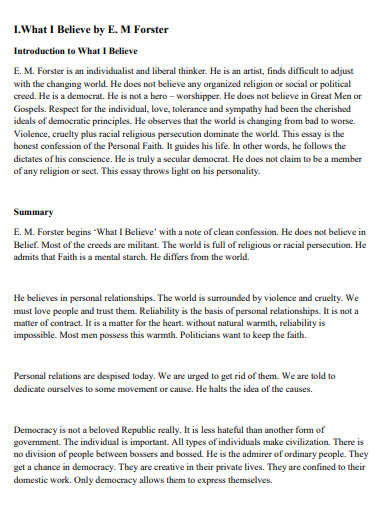
Size: 198 KB
23. Reflection This I Believe Essay Example
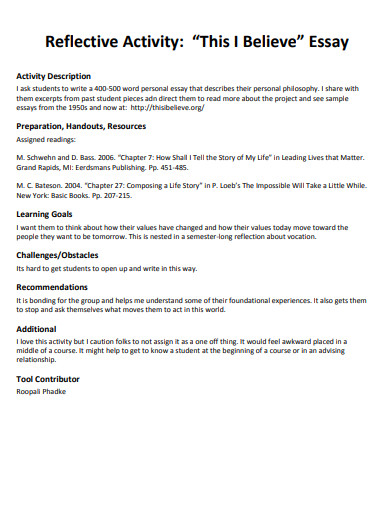
Size: 37 KB
24. This I Believe Immigration Essay Example
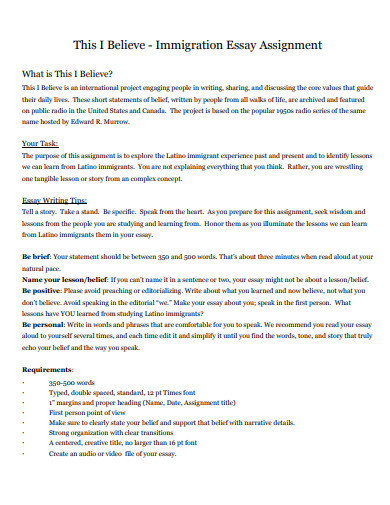
Size: 50 KB
25. This I Believe Love Essay Example
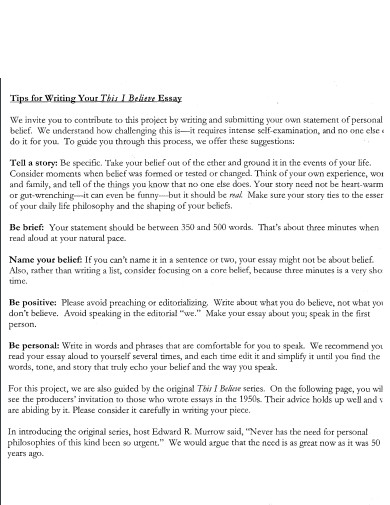
Size: 709 KB
26. This I Believe Dream Essay Example
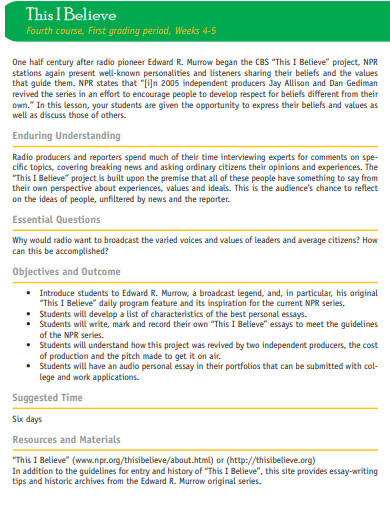
Size: 154 KB
27. This I Believe Power Essay Example
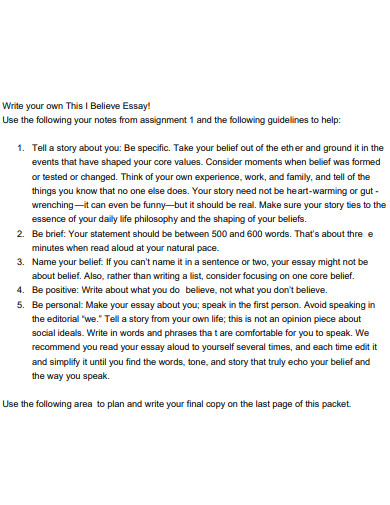
Size: 89 KB
28. This I Believe Essay Prompt Example
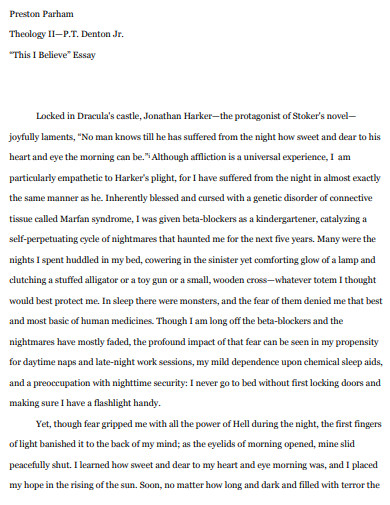
Size: 51 KB
29. This I Believe Essay Peer Review Example
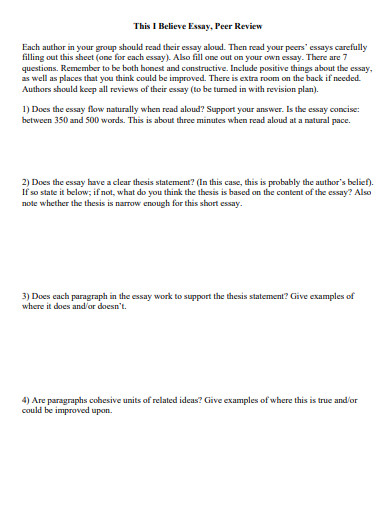
30. Elements of This I Believe Essay Example
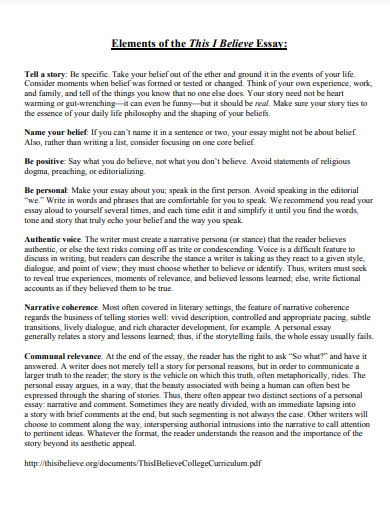
31. This I Believe Essay Transcript Example
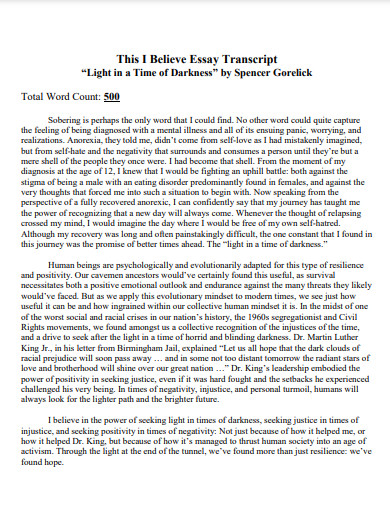
Size: 259 KB
What is a This I Believe Essay?
A This I Believe essay is a written composition that encapsulates an individual’s personal beliefs, values, and philosophies. Often reflective and intimate in nature, these essays offer readers insight into the author’s subjective understanding of the world. They provide an opportunity to explore the depth of one’s convictions, making use of various literary devices and characteristics to convey a sense of authenticity and sincerity. Through the exploration of individual experiences and convictions, these essays aim to connect with readers on a personal and emotional level.
How to Write a This I Believe Essay
Step 1: choose your core belief.
At the heart of your essay lies your core belief. Choose a belief that holds personal significance and represents your worldview. This belief should be something you feel passionately about and can articulate convincingly.
Step 2: Develop a Compelling Context
Create a context for your belief by providing background information. Explain why this belief is important to you and how it has shaped your experiences and outlook on life. A relatable context will engage your readers and make your essay more relatable.
Step 3: Employ Effective Literary Devices
Incorporate literary devices to enhance the impact of your essay. Metaphors, similes, and anecdotes can help convey your belief in a vivid and relatable manner. Consider how these devices can strengthen your narrative and connect with your audience emotionally.
Step 4: Craft a Strong Conclusion
Summarize your belief and its significance in your life, reinforcing the message you want to leave with your readers. Reflect on the journey you’ve taken them on and inspire them to reflect on their own beliefs.
Can I write about a commonly held belief?
Absolutely. While it’s important to maintain authenticity, even exploring a cliché belief can be powerful when you provide a fresh perspective or personal context. Your unique experiences and reflections make your essay stand out.
Can I use proper nouns in my essay?
Yes, proper nouns can add specificity and authenticity to your essay. Mentioning specific places, people, or events can help ground your beliefs in real-world experiences.
How can I make my essay more impactful?
Focus on using strong verbs to convey emotions and actions. Instead of saying “I felt sad,” consider saying “I crumbled under the weight of sorrow.” This adds depth to your writing and engages the reader’s senses.
In the realm of personal expression, the This I Believe essay shines as a vehicle for exploring one’s deepest convictions. By carefully selecting beliefs, weaving context, employing literary devices, and crafting strong conclusions, authors can create narratives that resonate with readers on a profound level. Through the power of words, these essays bridge the gap between individual experiences and universal truths, reminding us of the strength and diversity of human beliefs. So, take the plunge into introspection and share your beliefs with the world through the art of the This I Believe essay.

This I Believe Essay Generator
Text prompt
- Instructive
- Professional
Write a This I Believe Essay about the power of kindness in everyday life
Discuss in a This I Believe Essay how overcoming challenges has shaped your character

Want to create or adapt books like this? Learn more about how Pressbooks supports open publishing practices.
32 “This I Believe” Essay
The history of ‘this i believe’.
by Tanya Matthews
This I Believe is an exciting media project that invites individuals from all walks of life to write about and discuss the core beliefs that guide their daily lives. They share these statements in weekly broadcasts on NPR’s Morning Edition and All Things Considered .
The series is based on the 1950’s radio program This I Believe , hosted by acclaimed journalist Edward R. Murrow. Each day, some 39-million Americans gathered by their radios to hear compelling essays from the likes of Eleanor Roosevelt, Jackie Robinson, Helen Keller and Harry Truman as well as corporate leaders, cab drivers, scientists and secretaries — anyone able to distill into a few minutes the guiding principles by which they lived. Their words brought comfort and inspiration to a country worried about the Cold War, McCarthyism and racial division.
Eventually, the radio series became a cultural phenomenon. Eighty-five leading newspapers printed a weekly column based on This I Believe . A collection of essays published in 1952 sold 300,000 copies — second only to the Bible that year. The series was translated and broadcast around the globe on the Voice of America. A book of essays translated into Arabic sold 30,000 copies in just three days.
[The NPR series This I Believe can be read and heard here . In addition, the website and organization This I Believe houses thousands of essays written by famous people, such as the ones mentioned above, and everyday people like you and me.]
As a college student in 2020, you are faced with turbulent politics, socioeconomic issues, and ethical dilemmas that will challenge you to take a stand and contribute to the local, national, and global conversation around you. The purpose of this writing task is not to persuade you to agree on the same beliefs. Rather, it is to encourage you to begin the much more difficult task of developing respect for beliefs different from your own. Fifty years ago, Edward R. Murrow’s project struck such a chord with millions of Americans. It can do so again today…with you.
Video Resources for Generating Ideas
Dan gediman on writing a “this i believe essay”.
Read Cecelia Munoz’s essay “Getting Angry Can Be a Good Thing” referred to in the previous video here .
“This I Believe” Essay with Animation
“This I Believe” Essay Ideas
Prewriting Activity
1) analyze others’ statements.
Consider the following statements, written in response to the question What Have You Learned About Life? Highlight any sentences that resonate with you. Talk about them with a partner or group, explaining why. 1. I’ve learned that when I wave to people in the country, they stop what they are doing and wave back. – Age 9 2. I’ve learned that if you want to cheer yourself up, you should try cheering someone else up. – Age 14 3. I’ve learned that although it’s hard to admit it, I’m secretly glad my parents are strict with me. – Age 15 4. I’ve learned that if someone says something unkind about me, I must live so that no one will believe it. – Age 39 5. I’ve learned that there are people who love you dearly but just don’t know how to show it. – Age 42 6. I’ve learned that you can make someone’s day by simply sending them a little note. – Age 44 7. I’ve learned that the greater a person’s sense of guilt, the greater his or her need to cast blame on others. – Age 46 8. I’ve learned that no matter what happens, or how bad it seems today, life does go on, and it will be better tomorrow. – Age 48 9. I’ve learned that regardless of your relationship with your parents, you miss them terribly after they die. – Age 53 10. I’ve learned that making a living is not the same thing as making a life. – Age 58 11. I’ve learned that life sometimes gives you a second chance. – Age 62 12. I’ve learned that whenever I decide something with kindness, I usually make the right decision. – Age 66 13. I’ve learned that it pays to believe in miracles. And to tell the truth, I’ve seen several. – Age 75 14. I’ve learned that even when I have pains, I don’t have to be one. – Age 82 15. I’ve learned that every day you should reach out and touch someone. People love that human touch—holding hands, a warm hug, or just a friendly pat on the back. – Age 85 16. I’ve learned that I still have a lot to learn. – Age 92
2) Compose Your Own Statement
Write down a sentence that expresses what YOU have learned about life. Maybe it is similar to one of the statements above; maybe it’s completely different. Whatever it is, write it down.
3) Freewrit e
Now free-write about your sentence. Include at least two examples / experiences that you have had that support why you think this way.
Personal Statement/Philosophy: ______________________________________________________________________________________________________________________________________________________ Why do you believe in this statement? ______________________________________________________________________________________________________________________________________________________ Name two experiences that you had that would support the statement: _______________________________________________________________________________________________________________________________________________________________________________________________________________________________________________________________________________________________________________________________________________________________________________________ What does this say about yourself or your personality? _________________________________________________________________________________________________________________________________________________________________________________________________________________________________ After your life experience, how have you come to the conclusion that this should be your statement? How have your beliefs changed, if at all? ____________________________________________________________________________________________________________________________________________________________________________________________________________________________________________________________________________________________________________ How has the event effected your relationship with a person, place, or object? _________________________________________________________________________________________________________________________________________________________________________________________________________________________________ How does your statement apply to you today? (How you view yourself & society) ______________________________________________________________________________________________________________________________________________________
SAMPLE STUDENT ESSAYS
Sample #1: america’s beauty is in its diversity.
written by Alaa El-Saad, high school student, as heard on NPR’s Tell Me More (2009)
America is built on the idea of freedom, and there is no exception for Muslim women. I believe in the freedom of religion and speech. But mostly, I believe it’s OK to be different, and to stand up for who and what you are. So I believe in wearing the hijab.
The hijab is a religious head covering, like a scarf. I am Muslim and keeping my head covered is a sign of maturity and respect toward my religion and to Allah’s will. To be honest, I also like to wear it to be different. I don’t usually like to do what everyone else is doing. I want to be an individual, not just part of the crowd. But when I first wore it, I was also afraid of the reaction that I’d get at school.
I decided on my own that sixth grade was the time I should start wearing the hijab. I was scared about what the kids would say or even do to me. I thought they might make fun of me, or even be scared of me and pull off my headscarf. Kids at that age usually like to be all the same, and there’s little or no acceptance for being different.
On the first day of school, I put all those negative thoughts behind my back and walked in with my head held high. I was holding my breath a little, but inside I was also proud to be a Muslim, proud to be wearing the hijab, proud to be different.
I was wrong about everything I thought the kids would say or even do to me. I actually met a lot of people because of wearing my head covering. Most of the kids would come and ask me questions—respectfully—about the hijab, and why I wore it.
I did hear some kid was making fun of me, but there was one girl—she wasn’t even in my class, we never really talked much—and she stood up for me, and I wasn’t even there! I made a lot of new friends that year, friends that I still have until this very day, five years later.
Yes, I’m different, but everyone is different here, in one way or another. This is the beauty of America. I believe in what America is built on: all different religions, races and beliefs. Different everything.
Sample #2: The Essentials to Happiness
written by Alexxandra Schuman, high school student, as heard on The Bob Edwards Show (2013)
As a child, I was generally happy; singing and dancing to my favorite songs; smiling and laughing with my friends and family. But as far back as second grade, I noticed a “darkness,” about me. I didn’t enjoy engaging in many things. I didn’t relate to my peers in elementary school because they appeared so happy, and I didn’t have that ability to achieve happiness so easily.
In middle school things in my life began to get even worse. I began withdrawing from everything I once enjoyed; swimming, tennis, family. I hated going to sleep knowing I had to wake up to another day. I was always tired. Everything was horrible. Finally, midway through eighth grade, I was told I had a chemical imbalance; diagnosed with clinical depression and put on medication. It took months for me to feel the effects of the medication.
When I began to feel happy again, is when I realized that I had to take the responsibility for getting better myself, rather than relying on medication and therapy alone. Aristotle said, “To live happily is an inward power of the soul,” and I believe that this quote describes what I had to do to achieve happiness. Happiness is a journey. Everyone seems to need different things to be happy. But I believe people are blinded from what truly makes one happy.
Growing up, we’re encouraged to be successful in life; but how is success defined? Success and happiness are imagined now as having a lot of money. It is so untrue. Recently I went to Costa Rica and visited the small town of El Roble. I spent the day with a nine-year old girl named Marilyn. She took me to her house to meet her parents. It was obvious that they were not rich; living in a small house with seven children. The house was cluttered but full of life. Those who have decided that success and happiness comes from having money and a big house would be appalled at how utterly happy this family from El Roble is. People say that seeing things like that make you appreciate what you have, but for me, it made me envy them for being so happy without all the things I have.
“The essentials to happiness are something to love, something to do, and something to hope for,” a quote from William Blake sums up what I believe people need to realize to be truly happy in life. People need love; I feel they need their family and their friends more than anything in the world. People need work to do, something to make them feel they are making a difference in the world. People need to know that more good is to come in the future, so they continue to live for “now” instead of constantly worrying about the bad that could come. And most importantly people need to know that happiness is not something that happens overnight. Love and hope is happiness.
Sample #3: Find a Good Frog
written by Delia Motavalli, high school student, as heard on The Bob Edwards Show (2013)
I believe in finding a good frog. It seems that all throughout childhood, we are taught to look for a happily ever after. “And they all lived happily ever after”; isn’t that the conclusion to many children’s films? When I was a kid I always thought of that as magical; but now really it just seems unrealistic. And it teaches us that what we want is a fairytale like they have in the storybooks. We all want to be Cinderella who gets swept off her feet by the hot prince; we want to live in the royal castle, right? But I don’t think that’s necessarily a good thing for us to seek. Now I’m not saying I believe in being pessimistic, but I do believe in being realistic; it’s something I got from my mom.
My mother and I always have our best conversations in the rain. We sit in the car, neither of us wanting to brave the rain to get to the house. So we sit. We watch droplets race down the windshield, listen to the rain strike the roof of her little blue Honda, and feel the heater on full-blast rushing at our feet (just the way we like it). I don’t know why, but sitting in the car, we always talk more than normal. There was one rainy day when my mom told me something that is going to stick with me forever. Earlier that day she and my dad had been arguing about something; I can’t remember what. So she said, “Don’t spend your life looking for Prince Charming. Instead, find yourself a really good frog.”
At the time, I found this thought really disheartening. Who wants to think that you’ll never find Prince Charming? You’ll never get to be Cinderella? Another thought that struck my mind: if my mom says there’s no Prince Charming, then what’s my dad? A frog? I asked her, and she replied with, “Of course! If he were Prince Charming, he wouldn’t snore, would be able to cook, and we would never argue. But you know what? He’s a damn good frog.” Of course, being young, I didn’t think of the meaning behind what she was saying. I was too busy thinking of it literally, visualizing my mom as a princess and my dad in frog form.
But a few years later, I understand the value of my mom’s words. You can’t expect everything to be perfect. Let’s be completely honest; if you wait your whole life for your prince with flowing hair, statuesque features, and a white horse, you’re going to be lonely. I think that the point of finding a good frog is you accept something that’s great, flaws and all. It’s so easy to be picky. You can find the one tiny thing that’s wrong, and that one tiny thing is what you can’t get your mind off of. But in life, we can’t afford to wait years in vain for perfection. So I think that a good frog, an amazing frog, the best frog you can find is what we’re really looking for in this world. Don’t laze through life waiting for a happily ever after, because I don’t think you’ll be very happy with the outcome.
Examples from the ‘This I Believe’ Website
Be Cool to the Pizza Dude by Sarah Adams
They Lived Their Faith by Charles Henry Parrish
Returning to What’s Natural by Amelia Baxter-Stoltzfus
The Birthright of Human Dignity by Will Thomas
Remembering All The Boys by Elvia Bautista
I Am Still The Greatest by Muhammad Ali
A Goal Of Service To Humankind by Anthony Fauci
My Life Is Better by Abraham
Give Me a Waffle by Brenda
The Little Things by Sophie Crossley
You can also browse thousands more This I Believe essays by theme .
Prefer to Listen to Get Inspiration?
Check out This I Believe’s Podcast Series
4) Drafting
Assignment guidelines + suggestions and tips for drafting.
1. While the examples you’ve been given can serve as a model, it is essential that each of you write about a personal belief or philosophy that you feel strongly about. 2. Tell a story. Personal experiences are the corner stone of a good essay. Your story doesn’t have to be a heart breaker or even a major event, but it must be something that has affected how you think, feel, and act. List your personal experiences that you intend to use as evidence below: 3. Be concise. Avoid repetition. This essay should be between 500 – 650 words. When read aloud, it should take roughly four minutes. 4. Name your belief. It is essential that you can name your belief in a sentence or two. Focus on one belief only. This is your thesis. Write it here: 5. Be positive. Avoid preaching or persuading. You aren’t trying to change the way others think or act. Write about what you believe, not what you don’t believe. 6. Use the first person. Speak for yourself. Avoid using we or you. 7. Let your voice shine. Use language that sounds like you. Read it aloud as your revise. Keep making changes until your essay sounds like you and captures the essence of your belief.
5) Peer Review
Once you have written your first draft, arrange for your essay to be edited by a peer, using the following Peer-Editing Checklist: Writer’s Name: ________________________________________________ Peer Editor’s Name: ________________________________________________ Use your PENCIL or PEN (NOT red or green) to make corrections. Remember, this essay is a work in progress. You are not done writing! Look for ways to improve what you’ve already written. Tick each step if it has been completed. _____ 1. Read the paper backwards, one sentence at a time. Check for spelling errors. Use a dictionary, a friend, or a spell checker to find the correct spelling. _____ 2. Check for capitalized proper nouns and the first word of each sentence. _____ 3. Skip a line between each paragraph. _____ 4. Every sentence should have end punctuation. _____ 5. Check commas. Are they only used for compound sentences, a list of items, an introductory word or phrase, direct address, setting off interruptions, separating adjectives, or in dates? Do you need to add commas? Make sure you do not have commas separating complete sentences (i.e. comma splice errors that create run-on sentences). _____ 6. Apostrophes are used only for contractions and to show ownership. _____ 7. The use of more complex punctuation (dashes, hyphens, semi-colons, parentheses, etc.) is done correctly. _____ 8. Have you used commonly mixed pairs of words correctly? Check these: they’re/their/there, your/you’re, it’s/its, a/an, to/too/two, are/our/hour, and others. _____ 9. Read the paper backwards one sentence at a time. Check for sentence fragments and run-ons and correct them. _____ 10. Did you stay in present tense (such as is, am, do, take, know, etc.) or past tense (such as was, were, did, took, knew, etc.) throughout the entire essay? _____ 11. Did you stay in first person (I, me, my, we, us, our) or third person (he, him, she, her, they, them, their) throughout the entire essay? _____ 12. Was there adequate use of specific details and sensory details? Were the details clear and relevant to the statement? _____ 13. Is the overall purpose/philosophy clear? _____ 14. Does the conclusion make you go, “Wow!” “Cool!” “I never thought about it that way,” or any other similar reaction? Other suggestions for the overall content of the piece: ____________________________________________________________________________________________________________________________________________________________________________________________________________________________________________________________________________________________________________
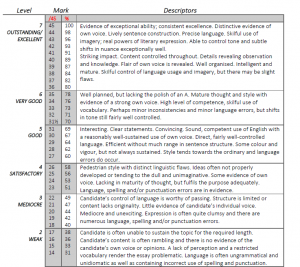
This I Believe by Tanya Matthews is licensed by CC-BY-SA
“This I Believe” Essay Copyright © 2020 by Liza Long; Amy Minervini; and Joel Gladd is licensed under a Creative Commons Attribution-ShareAlike 4.0 International License , except where otherwise noted.
Share This Book
Put a stop to deadline pressure, and have your homework done by an expert.
How To Write A Winning This I Believe Essay

One of the common types of academic writing you are likely to encounter is this I believe essay. In this type of essay, you are required to write about something you believe in. Note that unlike many students think, the topic does not have to be related to religion. For example, you can write about something you love or interested in.
Although writing this I believe essay might sound simple; many students find it one of the complex types of academic writing. To help make the process simpler, we created this guide to help you understand how to write the best this I believe essay. We have also highlighted the 22 hot essay ideas that you can use.
How To Write This I Believe Essays
Here’s a brief guideline on how to write a good belief essay:
- Get a good essay topic When you are faced with the task of writing a this I believe essay, the first step is selecting a good topic. At this point, you should look for something that you have learned about through various experiences, life struggles, or humanity. Because it is a piece of academic writing, it is advisable to go for a topic that has some resources that you can use to back personal arguments. This will make the essay weighty and earn you more marks.
In the body of the essay, you should dig into more details about your beliefs. Make sure to discuss each point in a separate paragraph and provide examples to support it. If the narrative is long, break it down into several sections and use subtopics.
- Write and proofread your essay After developing the essay structure, it is time to start writing it. Pool together the main points and write a draft. Then work on the final copy and proofread it carefully to remove all mistakes. You could even ask an unbiased friend to help proofread the essay.
Special Tips for Writing this I Believe Essay
Once your teacher asks you to write an assignment on this I believe essay; the secret is ensuring to understand a concept that you are passionate about. To make it simpler for you, try to be truthful. Here are some more tips to help you craft a winning this I believe essay:
Follow the guidelines provided by your teacher or department. Make sure to focus on the item of interest and support it with personal examples. If possible, support the essay with secondary resources. Make sure to stay positive about the topic of interest. Because you are working on something personal, make sure to write in the first person. Try to be as concise as possible. The focus should be selecting points that explain your belief and restricting the essay within the recommended number of words. Read other this I believe essay examples to understand how to craft a winning paper. Most samples can help you to understand how to structure the essay and discuss different topics.
Top This I Believe Essay Topics
The most critical thing about writing a this I believe essay is selecting a topic idea because it determines what to focus on and points to discuss. To help you get started, we are going to list 22 hot this I believe essay ideas for you. Go ahead and pick the one you prefer or tweak them to suit your preference.
- I believe in having a lot of fun in and out of school.
- I believe in using a mentor to build a career.
- I believe in using advanced technology for learning.
- I believe I am unique.
- I believe in dreaming big and going out of my way to succeed.
- I believe in hard work to succeed in life.
- I believe in my facility.
- I believe in our justice system to build a harmonious society.
- I believe in repentance and hope.
- I believe that time is the best way to cure pain.
- I believe in the support of my family.
- I believe in our culture.
- I believe in love.
- I believe in the power of God to heal the sick.
- I believe in life after death.
- I believe in doctors’ ability to help pregnant mothers safely deliver their babies.
- I believe I can make my county better.
- I believe in my basketball team.
- I believe in always trusting my guts.
- I believe in the nature top address the problem of global warming.
- I believe in dedication to my duties at work.
- I believe that everyone’s life is predetermined.
This I Believe Essay Topics
Are you looking for the best this I believe essay topics? You can start with these. They are all dynamic and don’t point to just one subject. They are based on different realities of life.
- Everyone has a positive outlook on life
- Success requires self-determination
- Life and creativity and interlinked.
- A good life provides a positive outlook on my life
- There are stipulated fundamental factors to success.
- There are many modes of achieving success.
- Sure shortcut to reading fast
- There isn’t any accurate journey to success.
- Determination leads to better time management
- Collaboration is the start of a beautiful career journey.
- Immigrants also have beautiful lives.
- Making the most of the available time in a day leads to more goal achievement.
- A good life is the result of hard work and determination.
- Many factors lead to stigmatization
- The right implementation can help improve the health care setting.
- Proper conservation can lead to a cleaner ecosystem and environment.
- Well-built bonds can lead to an increase in better human relations.
- The industrial revolution will make an impact on the world.
This I Believe Essay Topic Ideas
What do you conform to? Do you think your beliefs are similar to your neighbors? Then you can consider challenging yourself using this I believe essay topic.
- I believe that the world can be a better place when justice is implemented
- I believe that love can help to sustain many family bonds
- I believe positivity is a major factor that leads to success.
- I believe that people should have a positive outlook on life.
- I believe that leaders are both born and made.
- I believe that friendship is important when it comes to socialization
- I believe that strong family bonds lead to the prosperity of different people in certain capacities.
- I believe that the solar system needs to be done more research.
- I believe that all dreams are valid
- I believe that many ideas can be implemented.
- I believe in kindness, honesty, and faith.
- I believe that every person has a role to play to make an impact in the world.
- I believe that college plays a big role in making students think out of the box.
- I believe that robots will play a huge role in the future.
- I believe that artificial intelligence will boost the business world.
- I believe that everyone has a right to a good life.
- I believe that life is much simpler when people help each other.
- I believe that all ideas are valid, regardless of how crazy they seem.
This I Believe Essay Topic List
We all have different beliefs that make us who we are. However, you don’t need to be too rigid, you need to be flexible enough to accept any new perceptions. The world is ever-changing.
- People can get visions that later become reality.
- Animals have a brain of their own.
- Every person on earth has a mission.
- Sports are essential for boosting flexibility.
- Technical ideas can help make the world easier to live in.
- People have different callings in their professions.
- Everyone has a good heart.
- The world can be a better place without any violence.
- Dead people can listen to us.
- Ancestors still exist within us.
- All the different professions have a purpose.
- Augmented reality will change the world.
- Industry 4.0 will help to revolutionize the world.
- Everyone was assigned a purpose at birth.
- A good mindset leads to more happiness.
- Patience and perseverance are important in life situations.
- Faith, love, and hope are important.
- Everyone has virtues they follow.
Best Belief Essay Ideas
People have different beliefs that make them who they are. However, you need to make a point of having a firm stand on what seems like the reality of life.
- I believe everything happens for a reason.
- I believe that miracles do happen.
- I believe that healing happens to those who have faith.
- I believe in the power of prayer
- I believe in the existence of aliens
- I believe that anger can at times be a good thing.
- I believe that people need to accept themselves as they are
- I believe that people connect better by giving
- I believe that ordinary people can change the world.
- I believe it is more important to focus on the bigger picture.
- I believe that the environment one lives in plays a role in how one grows up
- I believe in workplace ethics.
- I believe that families are the greatest support system
- I believe that family support escalates how fast one heals when sick.
- I believe that people start socializing better when young
- I believe that information technology is a game-changer
- I believe that equality of people can make the world a better place.
- I believe that everyone needs to have goals in life.
Interesting This I Believe Research Essays
When doing an essay, you need to do proper research to ensure that you capture all that is needed. Here are some interesting “this I believe” essay topics from our essay writers for hire that you can start with.
- You should worry about being judged by others.
- Without education, you can’t succeed in life.
- Creativity is both inborn and made.
- Anger can spoil many things.
- Change comes from within.
- Being kind to others is important.
- Knowledge can help you succeed in life.
- Reading helps to increase your creativity.
- Having two jobs can help you prosper in life.
- Everyone has a right to true happiness.
- Good parenting is good for moral adults.
- Ordinary people can change the world.
- Humanity is vital for everyone.
- We all have different realities.
- Nations can simply be led by laws without men.
- Without rules, the world can be dangerous.
- Injustices can be reduced.
- Small acts of kindness go a long way.
What’s Next?
Now that we have provided you with great essay topics demonstrated how to start a this I believe essay and close it, it is time to get down to writing your paper. However, if you still find it hard to write your college essay or the deadline is tight, consider seeking writing help or buy homework .
Writing assistance is provided by experts who understand what is the best this I believe essay format and can craft it even within short deadlines. Also, they are cheap and provide their services with a guarantee for high marks. Therefore, why settle for average marks when you have an opportunity to get A-quality papers?
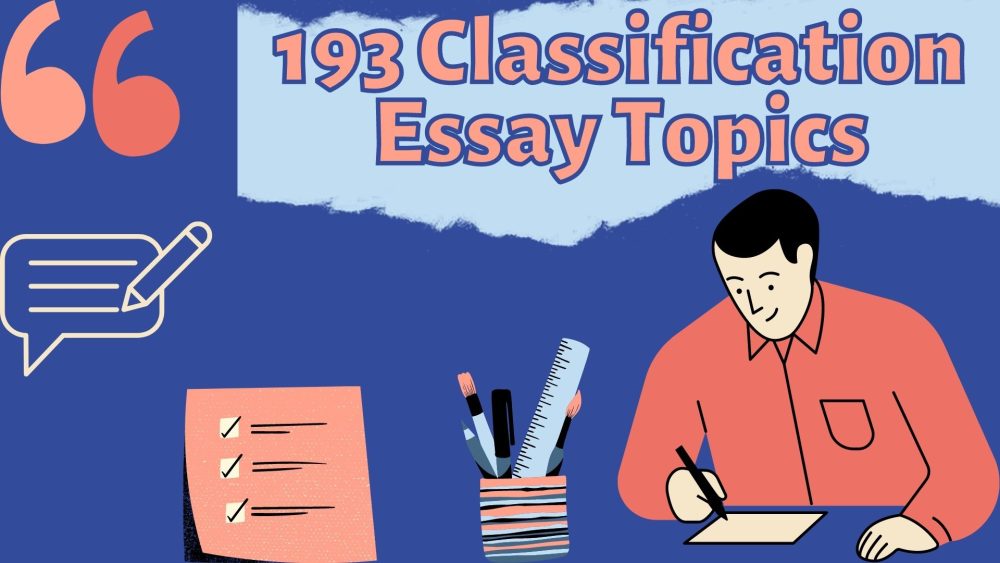
Get on top of your homework.
Leave a Reply Cancel reply
Your email address will not be published. Required fields are marked *
Power Lesson: “This I Believe” Essays
December 4, 2016
Can't find what you are looking for? Contact Us
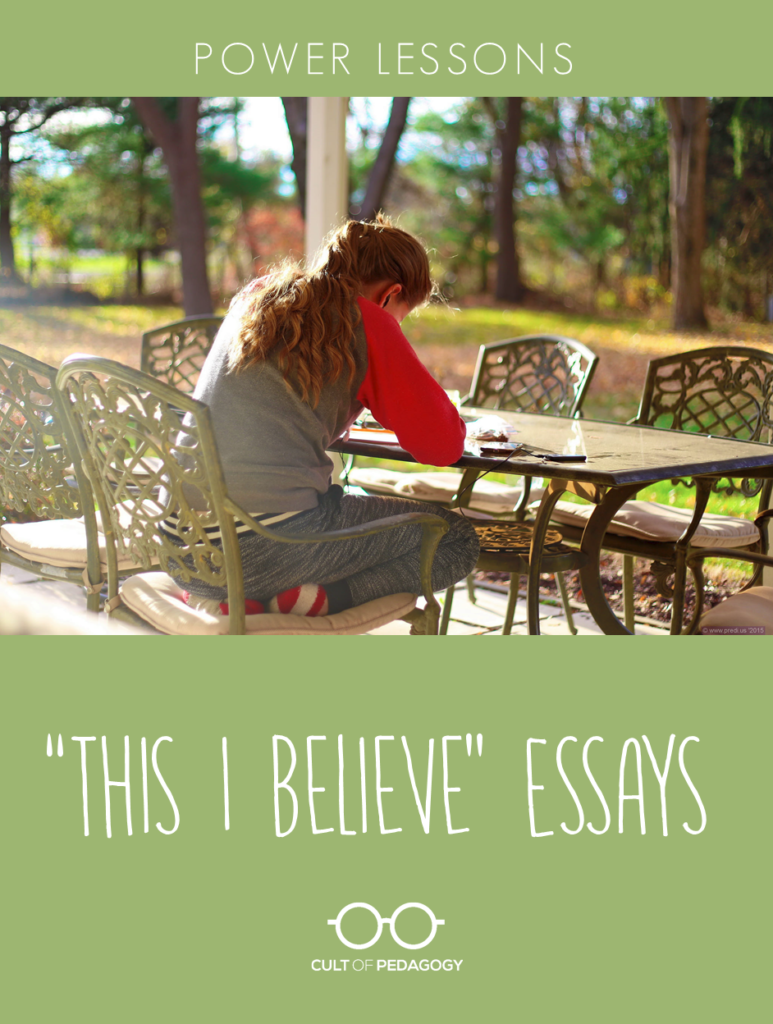
“Doing homework” by Predi is licensed under CC BY-ND 2.0
In this power lesson shared by high school English teacher Cynthia Ruiz , students write their own personal statements of belief. The essay pushes students to write about something that matters to them and helps them get to know each other on a deeper level.
I used to assign a “Letter to the Teacher” at the beginning of every year to get a snapshot of how a student writes while simultaneously learning background information. Being completely honest, this assignment is also an easy way to get the first few back-to-school days started when a 90-minute class period feels like 900 minutes, because everyone is typically on their best behavior and not talking much. Although I enjoy reading the letters, the assignment doesn’t lend itself to revising and is written only for a specific, one-person audience.
I know building relationships with students is important and a way to get to know them is through their writing, so I did some research to see what other teachers were trying. I came across the “This I Believe” site and immediately liked the concept better than an introduction letter for a teacher.
Assignment Guidelines
The first time I assigned a “This I Believe” essay was in the fall of 2014, during the second week of school. I planned it as a year-long endeavor, something we could work on as a distraction from other essays required to prepare for state testing. This past year, I did not assign it until late April; it would be our last major writing task. I wanted to give everyone plenty of time to write but held them to a firm deadline of having four weeks to work.
This time, I crafted my writing guidelines according to those posted on the NPR site that hosts hundreds of This I Believe essays from around the world. My rubric still has some typical writing conventions, but overall I think it focuses more on student voice than structure. I made it clear that students had a lot of choice regarding both content and format. The biggest restriction came directly from the This I Believe site: a 500-600 word limit. I know a lot of writing teachers are divided when it comes to word count, but I figured it was still better than giving a specific number of required paragraphs and sentences.
One other requirement was that students use at least three “vocabulary devices.” This may seem like a restriction, but it actually supported student voice. Over the spring semester, we spent a lot of time reviewing both rhetorical and literary devices (anaphora, hypothetical questions, simile) and I told students to focus on the devices they genuinely felt comfortable using.
Helping Students Choose a Topic
Because the rubric leaves room for a lot of choice, I encouraged students to visit the featured essays site and not only read, but listen to real examples. I wanted them to see that this wasn’t just another run-of-the-mill assignment, that what they believe is important and writing is just one way to share those beliefs. I also made it a point to tell them our end goal was to share this essay with their entire class by way of a gallery walk.
After giving students time to explore the site, I had them “rush write” in their notebooks to see what immediate ideas they captured to help start the brainstorming process. Here’s the prompt I used:
This I Believe For 2 minutes: List words or ideas that you think about when you think of YOUR LIFE. (Can be feelings, symbols, names, events, etc.)
After students generated this list, I asked them to consider what they wanted to write about and share with others. I wanted them to imagine a larger audience and think outside of meeting my expectations.
For some, deciding what to write about was easy and they began drafting immediately. However, the majority of students struggled not so much with what they believe, but how to write about it. Even though they appreciated having so much choice, they still needed some direction to get started.
We continued the listing strategy by focusing on “most memorables”: most memorable events in life so far, most memorable stuffed animal, most memorable friends, family experiences, life lessons learned, and so on. I asked them to focus on why they remember what they remember, and whether or not it impacts any of their beliefs. One student remembered a saying his grandmother always told him that still provides comfort as he’s gotten older. Another focused on her family not having a big house when they first moved to America and how she’s learned to be satisfied with opportunities instead of possessions. While this strategy helped a lot of light bulbs go off, it didn’t work for everyone.
Another strategy I tried was using involved sentence stems: I know I am the way I am today because______. I know I think about things the way I do because _______. I think most people would describe me as ______. I emphasized that these phrases did not have to be included in their final products, but should help generate ideas. I talked with a few frustrated students about this strategy and they told me it made them realize they’ve never really had to think about themselves in this way, but ultimately, it gave them direction for their essays.
Drafting and Revising
Because of block scheduling, I gave students about a week and a half to complete a working draft, which required having at least two paragraphs of their essay done. I only gave a portion of two to three class periods to actually write in class; students were expected to write on their own time.
On the day drafts were due, I set aside class time for revision. I asked students to refer to the rubric and focus on voice and vocabulary strategies. Questions I told them to consider were: Does this sound like me? Do I talk like this to my friends or family? I gave students the option of reviewing their own essays or partnering up with someone to peer edit. Again, this was the end of the year, so we had already established a pretty firm community of trust in class. I don’t know if peer editing would have been as easy had I done the assignment early in the year.
Overall, draft day didn’t feel like the usual “revising and editing” days we’ve had with other essays. Students were very concerned with whether or not they were making sense, if they should add more, or if they were being too repetitive, rather than only being concerned about capitalization, spelling, and grammatical errors.
Sharing the Finished Essays
The culmination of this assignment was when the essays were shared in a gallery walk . The gallery walk is my answer to having students write for a larger audience, and it really helps this essay become about what students have to say instead of just another grade. I can’t count how many times I have returned tediously graded essays only to have a kid immediately walk over to the recycling bin and trash it! Sure he read the comments and suggestions I made, or saw the cute smiley face I left by an excellent word choice, but it didn’t mean much to him because the paper is graded and finished, and he is now done thinking about it. With a gallery walk, not only are students thinking about what they wrote, but they have the opportunity to think about what their classmates wrote as well.
I printed each essay without any names, and made sure any identifying statements were revised. However, there were quite a few students who said they were proud of what they wrote and had no problem if others knew which essay belonged to them. Because not every student turned in a final copy, I printed additional copies of some completed essays to ensure every student had something to read during our gallery walk, instead of drawing attention to the two or three students who did not finish the assignment.
I placed the essays on different tables throughout the room and allowed students to move around as needed; some chose to stand and read an essay, others opted to sit, while others sprawled out on the floor to read. I played soft music and asked that the room volume stay quiet enough to be able to hear the music at all times. I didn’t mind if students were sharing and discussing, and I really wish I recorded the various conversations and comments I overheard that day: “Wow! Did you read this one yet?” “Man. Who wrote this? I might cry. Good tears, though.” “This one is life, Ms. Ruiz.”
I provided a pad of post-its near each essay and told students to leave POSITIVE feedback for each other. I provided sentence stems to help:
Something I liked…
Something I can relate to/agree with…
Something that surprised me…
Something I want to know more about…
I really think…
I periodically checked to make sure no one was being inappropriately critical or just leaving cute hearts or check marks. I wanted students to think about what they were reading, and understand that feedback is a crucial part of the writing process
After about 40 minutes, each essay had received multiple written comments, looking similar to the picture below:
Overall, the feedback was uplifting and actually created a sense of belonging in each class. Students told me they learned so much about each other that day and were shocked by their classmates’ writing. A few said they wished they had written this essay sooner.
Sample Student Work
I was floored by some of the essays I received. Some made me laugh, some made me gasp, some made me cry. Compared to the typical papers I usually assign, this essay allowed my students to not just think about what they were writing but to care about their writing and to be intentional in the language they were using, both in word choice and rhetorical strategies, because it was about what they believe. It is some of the strongest student writing I have ever received as an English teacher.
Here are some sample paragraphs from students who gave me permission to share their work:
From a student who told me he hates school and hates writing.
From a student who by all outward appearances, comes from a traditional family.
From a student battling depression and anxiety.
From a student who missed almost a whole semester but is trying to stay in school.
Although this essay helped end the year with a strong sense of community, I think teachers could easily have students write it at the beginning of the school year or even in January at the start of a new year. I’d love to hear how other teachers have used an essay like this in their classes. ♦
Have you taught a lesson or designed a learning experience we should feature in Power Lessons? Send a full description of your lesson through our contact form and we’ll check it out!
What to Read Next

Categories: Instruction
Tags: English language arts , lesson planning , power lessons
39 Comments
Cynthia and Jennifer, Thank you for sharing this Power Lesson; it’s one I plan on “borrowing” for sure in January. I love the connection built during the gallery walk. I can imagine this being truly powerful for all students. Well done!
I LOVE this!! I will use this in the Spring with my students. The excerpts in the blog post were so personal. I hope the students realize what a gift they shared.
Tonya, I agree. I’m always so grateful when students are willing to let us see their work here!
I love this assignment. I use it every semester with Public Speaking students, following a similar brainstorm and drafting process. Since the assignment comes from a radio program, my students audio record themselves, and our celebration of the work happens through hearing each student read the essay. Very powerful hearing their voices!
Ruth, thanks so much for taking the time to share this idea. I’m sure lots of teachers will love how audio enriches this assignment.
Thank you for sharing the students’ samples. Writing is such a great way to express oneself and when you make it personal students are engaged. ❤️ it! I am thinking about adding it as my last assignment for my 3rd graders!
Thank you for sharing, especially the students’ work samples.This will help inspire my students to share important details about their lives. Might I also recommend an excellent book I purchased used recently: Reading, Writing and Rising Up (by Linda Christensen)
I like this writing strategy. Last week I started something similar with my Arabic students. In groups of 3 to 4 students, they wrote stories (Brainstorm, first draft…) They started writing their final draft(with illustrations and drawings) on the butcher paper. On Monday, they will hang it on the wall and they will give each other feed back wile walking and reading each other’s essays. The problem with the foreign languages students writing is that they have brilliant ideas in English, but they cannot express them in Arabic or French… My questions is the following: Is there a way to adapt this writing strategy to World Languages students with taking into consideration the limited students’ language levels.
I love this assignment. I use at the end of the year with my seniors. I tell them to focus on a belief that they have formed over their past years of school and that will guide them as they make steps on their next journey — college, military, work, etc. Every year I am awed by the thought and pride they take in it. Their voices shine through the papers. The emotions, ranging from joy to sadness or humor to regret, overtake their essay making each both personal and universal. I also always write one that I individualize for each class and how they have shaped or firmed one of my own beliefs.
I love this, especially as a way to “re-enter” in January! I hope that I can use it effectively with my middle schoolers. Thank you so much for sharing this!
YES!! This was my first lesson in my first year of teaching and it completely set the tone for the rest of the year. The work I received from eleven year olds blew my mind, and I even submitted(with their permission) a few pieces to be published because they were that deep. Bravo to this I believe essays & sharing lessons like this with other educators.
Did you find that you had to add in any scaffolds/support for students? I want to try this with my 7th graders who really struggle with writing and getting started with ideas.
This looks like a fabulous project and one I am keen to try out next semester.
I, too, have been doing this assignment for a few years now. It is my favorite assignment of the year. I teach 8th grade English and I have my students share their essays aloud. We sit in a circle and listen to each student share his/her belief. It is powerful. We laugh. We cry. We learn. Having students write for an audience of their peers is challenging for them, but so rewarding in the end.
This looks great for January. I noticed that the This I Believe website has a high school curriculum for sale for $20. Has anyone used it? Is it worth it? Necessary?
This reminds me of an assignment I had in high school. It was called our “Capstone,” and was a year-long process (12th grade). We first chose three things that were important to our lives: a person, a place, and an event. Over the first semester we wrote about these in three separate papers. Then come second semester we had to connect them with a metaphor, and put together a 20 minute presentation that connected everything. It really allowed students to get creative while expressing what was most important to us.
Do you happen to have an example of this still? It sounds AWESOME and I would love to do it with my 8th graders!
Your students’ essays are beautiful, authentic and inspiring, as I am sure your teaching is. Thank you for sharing.
Thanks for the lesson. I like this idea for journaling too!
A brilliant idea! Thanks!
Thanks for sharing and including student work examples. Essays like this are a great way to get to know students at a deeper level and could also make a good college entrance essay!
Thank you for sharing this. Inspirational and heartfelt writing from young people.
This is so inspiring and beautiful. Thank you so much, both of you for sharing this power lesson. I was lookibng for a writing task muy ss could include in their e-Portafolio. Can’t wait to try it!! Thank you again!!
I know this might be simplistic, but could you share more about the vocabulary devices?
Hi, April! For the vocabulary devices, I’m referring to adding similes, metaphors, hyperboles, imagery, etc. We usually practice devices like anaphora and asyndeton in my advanced classes, so those can also be used. One of my favorite lines this year was: “I mean, I thought a step stool would do the job but instead it was like climbing a 20 foot ladder just to finish my goal…” We talked about how using a vocab device is more powerful than “I worked really hard.” Hope that helps! Cheers!
This is sooooo great!! I love it!!!!!
I love this. Has anyone tried it at the start if the year? Are students willing to write about such personal experiences and beliefs with a teacher and classmates that they don’t know well?
Hi Lizzie! I work for Cult of Pedagogy, but I’m replying as a teacher. I teach college level freshman comp and I started my previous semester with this essay. Because it was the beginning of the year, I didn’t do a gallery walk; it was more of a practice assignment to get used to the flow of papers and feedback. They had to bring in a rough draft for in-class workshops, so I made sure they knew a few of their classmates would be reading what they wrote. For extra credit, I offered them the chance to record their paper as a “podcast” and post it on YouTube. I was blown away by how in-depth most of them went! In fact, I’m starting my fall semester with it again.
I love this assignment in the spring for senior English. Generally, kids are appreciative that we’re doing the final writing assignment about something that is ‘real world legit’. I’ve always been impressed by their level of attention (and attendance),as our gallery walk happens on the last day of their English class in June.
Hi! This looks like a fantastic lesson and I would love to try it with one of my English classes. I noticed that your writing guidelines link is no longer available. Is there anyway I could get this information? Thanks Kelsey
Hi Kelsey! Thanks for letting us know about the link. This was a guest post and we will be happy to reach out to Cynthia to see if she has a current link to the writing guidelines. If so, we’ll get that updated on the post as soon as we can. Thanks again!
I was wondering about the guidelines as well. I teach in China and we are out of school right now for Chinese New Year, so I would love to have this when we return in February. Thanks for your help!
Hi Karen & Kelsey! I wanted to follow up on your request for the guidelines to let you know that Jenn no longer has access to them. If you haven’t already done so, Jenn recommends to check out the writing guidelines posted on NPR. I hope this helps!
I teach a course called Theory of Knowledge. One of the concepts we study is ‘faith’ as a way of knowing or gaining knowledge. I remember the “This I believe” series on the radio and then NPR. I have my students read several of the essays from the website and a few I copy from one of the books published. Then, they brainstorm and write their own essays. This spring, right before the Covid shutdown, one of my students committed suicide. I had returned his essay to him only days before; he’d written about the importance of love and relationships in life. Being able to share his essay with his mother and brother (who I had also taught) was a gift for all of us. I think the inspiration to have students write these essays was somehow a preparation for this sad experience. I like the suggestions here and may use the sentence stems to help those who struggle to get started.
Hello! I want to say that I had some difficulties in writing essays and statements. When I entered college, the first thing I encountered was writing a quality application.
thanks for sharing, this is really useful information for me!
thanks for sharing informative!
This looks like an amazing lesson plan and although it is late in the year I will try to use it. could you please send the grading rubric you used?
Hi, there! Because this post was written so long ago,we have unfortunately lost touch with the author, Cynthia Ruiz. From what we understand, she is no longer in the classroom. However, you may be able to connect with her on Twitter by clicking on the Twitter icon at the top of the post underneath Cynthia’s name.
If you are looking to create your own rubric, the section of this post called Assignment Guidelines links to the NPR website where Cynthia found the writing guidelines that she used as a basis for her own. In addition, there is another Cult of Pedagogy post on the single-point rubric , which you might find useful. I hope this helps!
Leave a Reply
Your email address will not be published.
- Skip to main content
- Keyboard shortcuts for audio player
This I Believe
- Subscribe to NPR's Up First Email
Celebrating Four Years Of 'This I Believe'
April 27, 2009 • During its four-year run on NPR, This I Believe engaged listeners in a discussion of the core beliefs that guide their daily lives. We heard from people of all walks of life — the very young and the very old, the famous and the previously unknown.
Saying Thanks To My Ghosts
April 26, 2009 • Novelist Amy Tan hasn't always believed in ghosts, but as a writer she's had too many inspirations that she can't fully explain. Now, Tan embraces her belief in ghosts and the messages of joy, love and peace they bring her.
Life Is An Act Of Literary Creation
April 23, 2009 • Mexican-American novelist Luis Urrea used to think that simply being a good observer would make his writing better. But over time, he's come to believe that being a good writer and a good person comes from paying attention to the world around him.

The Art Of Being A Neighbor
April 12, 2009 • A few years ago, Eve Birch was broke and living alone in a dilapidated mountain shack. But a community of people befriended her, shared what little they had with her and showed Birch the value of neighbors uniting to help one another.

Muhammad Ali John Lair/Muhammad Ali Center hide caption
I Am Still The Greatest
April 6, 2009 • To be the "Greatest of All Time," boxing legend Muhammad Ali says you have to believe in yourself. It's a lesson his parents taught him and it has helped him in fighting Parkinson's disease.
Dancing To Connect To A Global Tribe
March 29, 2009 • Matt Harding has been to 70 countries to dance — badly — in front of a camera, and videos of his travels have become an Internet sensation. Harding believes interacting with so many different people challenges him to understand what unites humanity.
My Father Deserves Spectacular Results
March 26, 2009 • Environmental activist Van Jones is a special adviser to the Obama administration. He says his dad, who died last year, would have gotten a kick out of seeing Obama become president. But his dad had high standards, and there is much more work to be done.
The Beatles Live On
March 15, 2009 • Macklin Levine was born more than 25 years after the Fab Four broke up, but at 12, she has a deep appreciation for Beatles music. "As old as the songs are, you can learn a lot about yourself from the lyrics," she says. And the Beatles help her remember her Dad, too.
Finding Freedom In Forgiveness
March 5, 2009 • Jennifer Thompson-Cannino was certain that Ronald Cotton was the man who raped her in 1984. But she was wrong. After Cotton spent 11 years in jail, DNA evidence proved his innocence. Now, the two have a friendship based on their belief in forgiveness.
Work Is A Blessing
March 1, 2009 • When he was 12, Russel Honore got his first job helping a neighbor milk 65 dairy cows twice a day. Fifty years later, the retired Army lieutenant general believes hard work helps build character, strengthen communities and promote freedom.
Seeing Beyond Our Differences
February 26, 2009 • Scientist Sheri White says that despite differences in size, shape and color, all humans are 99.9 percent biologically identical. White believes we should embrace our similarities and honor the differences that make each of us unique.
Historical Archives
Reflections on race: essays from the archives.
February 23, 2009 • Dan Gediman, executive producer of NPR's This I Believe, explores the archives of the original series hosted by Edward R. Murrow in the 1950s. He says the essays shed light on the realities of segregation at the dawn of the civil rights movement.
Gediman explores the 'This I Believe' archives.
The magic of letters.
February 15, 2009 • Chameli Waiba was raised in a village in Nepal and didn't attend school as a child. When she finally learned to read as an adult, Waiba discovered the power words could have to change her life, as well as the lives of others in her rural community.
How To Survive Life's Tests
February 9, 2009 • Kendra Jones assigned her students to write This I Believe essays and decided that she owed it to them to write one of her own. Jones believes toughness, steeliness and even meanness have helped her throughout her life.
Our Awareness Controls Human Destiny
February 8, 2009 • In an essay from 1951 for the original This I Believe series, Margaret Mead says she can't separate the beliefs she has as a person from the beliefs she has as an anthropologist. She says that humans have a responsibility for the entire planet.
A Hope For Bettering Humanity
February 1, 2009 • In an essay from 1953 for the original This I Believe series, Sir Charles Galton Darwin, the grandson of naturalist Charles Darwin, drew on his study of science to say he believed the future of humanity depended on the practice of eugenics.
Listening Is Powerful Medicine
February 1, 2009 • It took a scolding from an elderly patient to get Dr. Alicia Conill to look up from her charts and stop to listen. Conill came to understand the value of listening in the treatment process — especially when she herself became the patient.
America's Beauty Is In Its Diversity
January 29, 2009 • In sixth grade, Alaa El-Saad decided to start wearing the hijab , a religious head covering for Muslim women. Despite some trepidation, she found her classmates supported her choice. Now El-Saad believes being different is part of being American.
Thirty Things I Believe
January 18, 2009 • When Tarak McLain's kindergarten group celebrated their 100th day of class, some kids brought 100 nuts or cotton balls. Tarak brought a list of 100 things he believes. Now a first-grader, Tarak shares his top beliefs about God, life, nature and war.
Inviting The World To Dinner
January 12, 2009 • Every Sunday for 30 years, Jim Haynes has welcomed complete strangers into his Paris home for dinner. By introducing people to each other and encouraging them to make personal connections, Haynes believes he can foster greater tolerance in the world.
Pathways Of Desire
January 4, 2009 • Gina Parosa believes in letting her kids, pets and livestock make their own paths in life. But she also realizes that as a farmer and parent, she sometimes has to step in and set good boundaries — while still being flexible enough to change them.
This Is Home
January 1, 2009 • Majora Carter believes you don't have to move out of your old neighborhood to live in a better one. Carter was raised in the South Bronx and spent years trying to leave. But when the city proposed a waste facility there, she was inspired to fight for her community.
Health Is A Human Right
December 21, 2008 • As an infectious disease specialist, Dr. Paul Farmer has traveled the planet to organize and provide medical treatment for people living in poverty. He believes good health care is vital but just the first step in creating a world free of all human suffering.
- EssayBasics.com
- Pay For Essay
- Write My Essay
- Homework Writing Help
- Essay Editing Service
- Thesis Writing Help
- Write My College Essay
- Do My Essay
- Term Paper Writing Service
- Coursework Writing Service
- Write My Research Paper
- Assignment Writing Help
- Essay Writing Help
- Call Now! (USA) Login Order now
- EssayBasics.com Call Now! (USA) Order now
- Writing Guides
How to Write A ‘This I Believe’ Essay
Table of Contents
How to Write the Essay on ‘I Believe’
The ‘I believe’ is an essay that expects an individual to write about the particular beliefs that a person has. This topic does not necessarily need to be a religion as thought by many students. It is what can carry someone’s interests. Anything that comes to mind is applicable as long as it is a belief to you and in society like an essay on love and proof that love exists either personally or generally. Besides, it applies to writing about something which people do not believe in its existence. Similarly, the essay can be personal or based on research. In research, one is expected to support their ideas with references to the provided source. The written story should be accurate and have the ability to carry the readers easily. If possible, the writing should be able to bring the reader into believing the particular theme used despite their beliefs. The idea provided should have the emotional status of the user depending on the trait presented. If it is a funny story, the reader should be able to be carried in the capacity where they find themselves laughing without expecting it. In this case, the story will be real. Moreover, consider the particular moments for the creation, testing, or changing of your principles and ensure the story surrounds the essence of a person’s daily life values to the shaping of their beliefs. Besides, this essay should be a reflection of the life of an individual. One has to explain their faith critically in this article and after that relate to life including the personal beliefs one has experienced. A statement or the body in the explanation of this essay should be as brief as possible. The shorter the length, the greater the focus on the central belief in an individual’s life.
How to Start this I Believe Essay
Before beginning to write the essay construct a structure that guides the writing of the entire article. At the beginning of the piece, to be able to explain one’s belief quickly, the writers have to talk about the main idea just like in introduction of other essays where you state and explain your objectives in the article. It is always best when a writer quickly explains the core belief focused on in the piece. The introduction should only comprise the ‘I believe’ statement and a phrase to attract the reader.
How to Write Body Paragraphs for this I believe essay
The body structure which entails all the events in the paragraphs provides a detailed explanation using figurative language which should always have the letters ‘a’ and ‘e’ to enable the reader quickly see the story and provide a smooth flow in writing. Also under the body, one should create a paragraph about what they have learned from the belief and the effect this view on their lives into them growing into well-rounded people. Through identifying the picture, explain the application of this idea in one’s personal life in the future . The writer always has to remind the reader of the core belief they stated in the introduction and their hope to share this knowledge with the reader. Also, an explanation of why the reader should care about their personal beliefs and their teaching lesson to the reader entailing what the reader learns. When writing a “this I believe” assignment despite allowing a writer to write either the positivity or negativity in their beliefs this is what they believe in or what they do not believe in, it is always best to focus on one’s beliefs to compose an excellent essay.
How to conclude the Essay
It is not advisable to include religious belief statements, preaching, or editorializing when constructing the article. Also, always make the article about one’s yourself. Writing in the first person is allowed in this type of composition to bring out the personal belief perspective apparently.
Tips for Final Revision
Upon completion of describing one’s opinion, edit the piece to ensure the right word tone used lacks the editorial ‘we’ and provides an echo of one’s beliefs and original manner of speech towards people. The essay composed should be a personal story; not an opinion piece about social ideals. Review the written piece and compare it with the provided instructions to make ensure the correct answering of the questions. Remove any mistakes or spelling problems and ensure there is a flow in the writing of the essay. Also, ensure that the structure of the paragraphs has supporting detail and an explanation of the detail as per the stated point. In the writing of this section, the approach employed should not be direct. The sentences constructed should be simple. The essay after every sentence should leave the reader with suspense and an urge to know what comes next. They should not be able to predict the events because if they do the ‘I believe essay’ will be very annoying. Finally, the most important thing is to stay on topic. A person’s core belief in an article is the subject of the composition. For example, writing on a core belief as ‘love’ should be the only idea covered in the essay. Also, ensure that the formats used are per the required forms. In doing all this an excellent ‘this I believe composition’ will be poised.
Outline Example for this I Believe Essay
Introduction – Introduce the aim of writing the paper.
Thesis statement
- Paragraph one – Introduce your first point on the “this I believe” paper.
- Paragraph two – One should create a paragraph about what they have learned from the belief
- Paragraph three – Explain the application of the specific idea in one’s personal life in the future.
Closing paragraph – Restate the purpose of the essay (What has the text shown us?).

53 This I Believe Essay Topic Ideas & Examples
🏆 best this i believe topic ideas & essay examples, 📌 most interesting this i believe topics to write about, ❓ this i believe questions.
- This I Believe: What Goes Around Comes Around – Essay I never did my homework and it became so hard for me to catch up with the rest in class. This was the time when I remembered the words of my grandmother “only fools rush […]
- This I Believe: Happiness Is a Choice I know that I can choose to be happy. I was ashamed and worried that he would know I took it. We will write a custom essay specifically for you by our professional experts 808 writers online Learn More
- Art and Creativity to Solve Problems I believe that art is the deepest expression of the society and the beliefs it underscores. I believe in the unity of the human race and bringing an end to racism and human trafficking.
- This I Believe: Making the Most Out of Time
- Discovery Can Be a Nuisance: This I Believe in Genetics
- This I Believe: Life and Creativity
- A Philosophy of Health Education: This I Believe
- This I Believe: Thomas Mann on Time and the Meaning of Our Existence
- This I Believe About the Care of Human Beings
- Acceptance and Respect for Beliefs Different From One’s Own: This I Believe
- This I Believe: Live a Life of Love
- Resources in Support of This We Believe
- The Personal Philosophies of Remarkable Men and Women: This I Believe
- This I Believe: My Positive Outlook on Life
- Activities of the Non-profit Organization: This I Believe
- Goals and Philosophy of This I Believe
- The Personal Philosophies of People From All Walks of Life for This I Believe
- Thought Provoking by This I Believe
- “This I Believe” About the Good Life: What It Means to an Immigrant
- Discussing This I Believe Topics in Public Places
- This I Believe: An Intermission From This Fast–Paced Life
- Writing Tips for This I Believe
- This I Believe- Type of Leader
- Shaping of Beliefs Through This I Believe Stories
- This I Believe: Positivity Is the Key to Success
- Uncovering Sources of Power From Personal Beliefs in This I Believe by Eve Ensler
- Using This I Believe in Common Reading Programs
- This I Believe: Self-Determination
- What Psychologists and Psychotherapists Say About the Program This I Believe?
- How Do You Begin an Essay for This I Believe?
- What Is the History of This I Believe Program?
- Is This I Believe a Real or Is It Scripted?
- What to Write for This I Believe?
- How Long Are This I Believe Essays?
- What Is the Greatest “This I Believe” Essay Ever Written?
- What Are Ideas to Write an Essay Starting in the Theme of “This I Believe”?
- What Is a This I Believe Speech?
- What Famous Peolpe Wrote Their This I Believe Essays?
- What Updike Wrote About in This I Believe His Essay?
- Why Jay Ellison Decided to Collect the This I Believe Essays Into a Book?
- What Is the Plot of This I Believe?
- What Experience Can Be Gained From the This I Believe Program?
- What Is the This I Believe Project?
- Can People From Other Countries Write to the Program This I Believe?
- How Much It Costs to Participate in the Program This I Believe?
- Is It Possible to Describe Bad Life Experiences in This I Believe?
- How Many Years Has the Program This I Believe Been in Existence?
- Were There Cases When People Described Crimes in the Program This I Believe?
- Does This I Believe Have Any Connections With National Suicide Prevention Lifeline?
- Has the Program This I Believe Ever Featured Stories About War or Refugees?
- How Does the Program This I Believe Help to Change Lives?
- What Is This I Believe Purpose?
- What Are the Most Popular Essay Topics for the Program This I Believe?
- Chicago (A-D)
- Chicago (N-B)
IvyPanda. (2023, November 8). 53 This I Believe Essay Topic Ideas & Examples. https://ivypanda.com/essays/topic/this-i-believe-essay-examples/
"53 This I Believe Essay Topic Ideas & Examples." IvyPanda , 8 Nov. 2023, ivypanda.com/essays/topic/this-i-believe-essay-examples/.
IvyPanda . (2023) '53 This I Believe Essay Topic Ideas & Examples'. 8 November.
IvyPanda . 2023. "53 This I Believe Essay Topic Ideas & Examples." November 8, 2023. https://ivypanda.com/essays/topic/this-i-believe-essay-examples/.
1. IvyPanda . "53 This I Believe Essay Topic Ideas & Examples." November 8, 2023. https://ivypanda.com/essays/topic/this-i-believe-essay-examples/.
Bibliography
IvyPanda . "53 This I Believe Essay Topic Ideas & Examples." November 8, 2023. https://ivypanda.com/essays/topic/this-i-believe-essay-examples/.
- Motivation Research Ideas
- Inspiration Topics
- My Best Friend Titles
- Existentialism Paper Topics
- My Family Research Topics
- Personality Psychology Research Topics
- My Hero Titles
- Belief Questions
- Self-Awareness Research Topics
- Kindness Research Ideas
- Self-Concept Questions
- Mindfulness Research Ideas
- Television Ideas
- Media Analysis Topics
- Oprah Winfrey Topics

Common Reader (2019-2020): This I Believe: Discussions, Guides, & Questions
- This I Believe: The Personal Philosophies of Remarkable Men and Women
- The Authors: Jay Allison and Dan Gediman, eds.
- Discussions, Guides, & Questions
- Further Research
- Belle Glade Campus
Instructor Toolkit
- Teacher's Guide (Picador) Teacher's Guide for "This I Believe: The Personal Philosophies of Remarkable Men and Women," edited by Jay Allison and Dan Gediman, Foreword by Studs Terkel Consists of mainly three sections: Reading and Understanding the Book, Questions and Exercises for the Class, and Terms and Phrases to Define
- This I Believe Essay Writing Suggestions
- Power Lesson: “This I Believe” Essays In this power lesson shared by high school English teacher Cynthia Ruiz, students write their own personal statements of belief. The essay pushes students to write about something that matters to them and helps them get to know each other on a deeper level.
- Giving Voice to Students Through "This I Believe" Podcasts: Lesson Plan Sherman, Krista; Published by the International Literacy Association
- This I Believe: Sample High School Writing Curriculum
Discussion Questions
- Reading Group Guide (Holt Paperbacks) Discussion Questions for "This I Believe: The Personal Philosophies of Remarkable Men and Women," edited by Jay Allison and Dan Gediman

Download this free poster to promote This I Believe activities happening in your classroom. The poster measures 11 inches by 17 inches and is ideal to hang in classrooms. Document is best printed in color. For best results, these documents may be printed at your local print shop.
Source: https://thisibelieve.org/educators/
- << Previous: The Authors: Jay Allison and Dan Gediman, eds.
- Next: Further Research >>
- Last Updated: Oct 4, 2023 12:06 PM
- URL: https://palmbeachstate.libguides.com/ThisIBelieve
- AI Content Shield
- AI KW Research
- AI Assistant
- SEO Optimizer
- AI KW Clustering
- Customer reviews
- The NLO Revolution
- Press Center
- Help Center
- Content Resources
- Facebook Group
Interesting Guide to Writing a “This I Believe” Essay
Table of Contents
A This I Believe essay is a particular type of writing that needs to contain a personal experience on a particular subject. These types of essays define a particular belief to the reader.
If you’re looking for This I believe essay guidelines , this article is a great resource for getting started on creating a personal essay. There are tons of points to consider as you write your essay to show your connection with the statement of your belief. Keep reading to learn more!
What Is a “This I Believe” Essay?
“This I Believe” is a popular type of essay genre that enables the author to communicate a personal belief. Through a narrative, the author explains the origin of that belief or a period when that belief was put into practice.
In these essays, people write about the core beliefs that drive their daily lives. Ultimately, your personal motivation will keep you steadfast in your work and get you through the toughest times.
The 1950s radio program with Edward R. Murrow introduced the essay genre, which NPR continued in 2004. Since then, numerous people have loved writing and reading these pieces.
Significance of “This I Believe” Essay
A “This I Believe” essay is a personal reflection on the writer’s life, their influences, and what motivates them. It is a time for the author to take stock of their thoughts and inform readers of their thoughts, feelings, and motivations.
These essays can reveal a person’s life passages, extraordinary moments, and inspirations. “This I Believe” essay allows the reader to get a feel for your personality, your strengths and weaknesses, and your perspective on the world.

Write Using “This I Believe” Essay Guidelines
If you are writing a This I Believe essay, you will typically be giving your experience as a personal essay. In this essay, you will detail what you believe and why you believe it. Clarify the point you are trying to make. Keep in mind your intended audience and stay focused.
Here are some this I believe essay guidelines to help you craft a perfect piece of writing:
Tell a Captivating Story About Your Belief
Tell the readers when you came to your belief and how it affected you. However, keep in mind that it should be true. Be honest and genuine with your thoughts.
Your story doesn’t have to force others to share the same belief. Connect your writing to your life and be sincere about your beliefs. Only then you will have a good chance to dazzle readers with a compelling story.
Keep Your Essay Short and Concise
Restricting yourself to one page will keep your essay concise and readable. It’s recommended to keep your writing between 400-600 words. It shouldn’t be too long.
It shouldn’t take more than 3–4 minutes to read your completed document aloud. Thus, it’s crucial to include only the most relevant information while packing your writing with your ideas.
Make Sure You Mention Your Belief
When writing this I believe essay introduction , make sure to focus on your belief and describe it briefly in a few sentences. If you don’t mention your belief clearly, the paper might be confusing or fail to reflect the core idea you wanted to convey. You must concentrate on the most crucial details of your story as you need to keep your essay concise.
Write in the First Person Point of View
This I Believe essays should be about your own life, not someone else’s. So, you must use the first-person point of view.
Write an essay about your viewpoint without focusing on what other people ought to do. Your assignment is to share a true story from your life without equating it with any societal ideals or religious principles.
Be Genuine and Positive
One of the most important things while writing this essay is to be genuine and on a positive set of mind. Don’t say something you don’t believe. A This I Believe essay should not contain any editorializing, advertising, or religious content. If you focus on yourself, you’ll be able to articulate your sentiments.
A This I Believe essay is written in the first person point of view and includes informative, personalized details about the writer’s belief. The goal of the essay is to tell an underlying story that conforms to the above This I Believe Essay Guidelines. And the narrative leads from past experiences to the present. The readers understand the writer’s beliefs through their personal stories and life experiences.

Abir Ghenaiet
Abir is a data analyst and researcher. Among her interests are artificial intelligence, machine learning, and natural language processing. As a humanitarian and educator, she actively supports women in tech and promotes diversity.
Explore All Essay Intro Generator Articles
The different ways to start a comparative essay.
Some writers intend to compare two specific things or ideas through their articles. They write these essays to compare and…
- Essay Intro Generator
Know The Best Way to Start an Expository Essay
Are you into writing essays that tackle a still-unknown fact? Do you know how to write an expository essay? Before…
Writing an Opinion Essay? Read This First!
Students are required to express their opinions on a topic in an opinion essay. Pertinent illustrations and explanations support their…
Identifying the Best Transitions to Start an Essay
A typical academic assignment is the essay, which must meet certain requirements in order to be written properly. Even students…
How to Write Introductions for Synthesis Essays
One of the most exciting assignments you could have is writing a synthesis essay. For a college or university student,…
How to Write Introductions for Music Essays
Music is food for the soul, or so they say. A music essay analyzes or describes a piece of music,…
10 English Phrases to Express Your Opinion in an Essay
This is a guest post by Sam Pealing. Make sure to visit his website EnglishForStudy.com for more academic English help!
I admire international students. Seriously. If you’re a non-native English speaker doing a degree or doctorate in English, then I take my hat off to you.
I get a lot of questions about writing essays, and I’ve taught hundreds of students how to write effective essays (which get good grades). One of the most common mistakes that I see is a lack of opinion.
Most of the time, students describe a situation, but they don’t give their opinion or stance. This can really damage your grade because lecturers are always looking for ‘critical thinking’. If you don’t give your opinion in your essays, your lecturers can’t see your critical thinking.
To put it simply: If you don’t put your opinion or stance in an essay, then you’ll probably lose marks.
In this article, you’ll learn 10 effective phrases that you can use to give your opinion in your essay. I’ve also created a free lesson pack which will help you to practice the phrases in this article. CLICK HERE to download it.
Introducing the Phrases
If you’re looking for a quick fix for your essay, these phrases should help you to start putting your own opinions in your essays.
But, before you rush over to your essays to start putting these phrases in, there’s something you need to know.
If you’re writing an academic essay, you will need to support your opinions with strong evidence . This is especially true if you are using some of the stronger phrases.
This evidence can be a journal article, a lecture, a textbook, or something else which is a trustworthy source of information.
In a more informal essay, like one in an IELTS or TOEFL language test, you don’t need to support your answers with strong evidence. Your experiences or opinions will be enough.
Quick note : I know! You’re ready to see the phrases.
This won’t take long and it’s really important.
1. For these phrases to be really effective, you’ll need to review your grammar. Shayna has some great videos on her Espresso English Youtube channel .
I recommend these:
- Subject/Verb agreement
- Formal and Informal English
- Correcting Grammar Mistakes
2. If you want to know the structure of a good essay paragraph, check my post here .

Informal English Phrases
These phrases are suitable for language tests such as TOEFL or IELTS. In an academic essay, these phrases will probably be too informal because they are too personal.
“In my opinion, + [your sentence]”
- In my opinion , a good education is more important than a good car.
“I believe that + [your sentence]”
- I believe that schools should encourage students to walk or cycle to school rather than drive.
“In my mind, + [your sentence]”
- “ In my mind , no-one should have to pay for medical care.”
More Formal Academic Phrases With ‘That’
These phrases are more suitable for academic essays. If you are unsure whether you should use an informal phrase or an academic phrase, use an academic one. If you think your writing might be informal, read this post to learn more.
The patterns here are quite straightforward. Just add your sentence after ‘that’.
“It would seem that + [your sentence]”
Use this when you support your opinion with evidence.
- “ It would seem that children learn best when they are feeling comfortable.”
“It could be argued that + [your sentence]”
Use this when you want to challenge an existing opinion.
- “ It could be argued that the benefits outweigh the drawbacks in this situation.”
“This suggests that + [your sentence]”
Use this when you don’t want to fully commit to an opinion. You’re giving yourself some distance.
- “ The evidence suggests that people who speak more than one language have more job opportunities.”
“This proves that + [your sentence]”
Use this when you are confident with your opinion. This phrase is quite strong*
- “ This proves that the best way to lose weight is through a controlled diet and a good exercise program.”
“This supports the idea that + [your sentence]”
Use this one when you are supporting an opinion that you have already made.
- “ This new research supports the idea that successful English learners look for opportunities to use English.”
Other Ways to Express Opinion
“although [idea you disagree with], [idea you agree with]”.
Use this when you want make your opinion seem balanced.
- “ Although reports suggest that cigarettes could help people to lose weight, there are too many serious health problems associated with smoking.”
Note: The ‘ although’ pattern is very effective because it shows two sides of the argument. In the example, I support the idea that smoking is bad for your health –BUT- I recognise that it could have some benefits.
Structure your ‘ although’ sentence like this: Although, [weaker argument you disagree with], [stronger argument you agree with].
Using Adverbs, Adjectives and Nouns
You can use adjectives to show your opinion.
- “This research was poorly conducted with a lack of control .”
The adjective and nouns in the example are negative . You can get some good ideas from this video on Extreme Adjectives . Note: try not to use any emotional adjectives .
Make Your Own Phrases!
Of course, these phrases aren’t the only ones that you can use! You can find more – or – you can create your own by combining different patterns.
Here’s an example of #7, #9 and #10 used together.
“Although it is difficult for older adults to learn a second language, an important study by Smith (2014) proved that the elderly can successfully learn new languages.”
What Should You Do Now?
So now you should have a better idea of how to include more opinions in your essays. But that’s not all; there are probably some new words here that you don’t know.
So here’s what you should do:
- Choose three of the opinion expressions and phrases that you want to try.
- Practice writing sentences using them (if you don’t have a topic, try this: should students do homework? You can see examples of this in the lesson pack )
- Get the Lesson Pack for this lesson (which contains the vocabulary and the phrases from this lesson) CLICK HERE to download it .
Learn more:
- Basic English phrases
- Intermediate English phrases
- Advanced English phrases
About Sam Pealing
Sam Pealing is an English language coach who specialises in two important areas: 1. helping you to get great grades at university, and 2. helping you to become an effective and confident English user. If you’re feeling frustrated or confused with English, Sam has created the perfect email course for you! You can join his course here –or- you can read more by him on English For Study .
Get corrections on your written English:

More Espresso English Lessons:
About the author.
Shayna Oliveira
Shayna Oliveira is the founder of Espresso English, where you can improve your English fast - even if you don’t have much time to study. Millions of students are learning English from her clear, friendly, and practical lessons! Shayna is a CELTA-certified teacher with 10+ years of experience helping English learners become more fluent in her English courses.

19 Other Ways to Say “I Believe” in an Essay
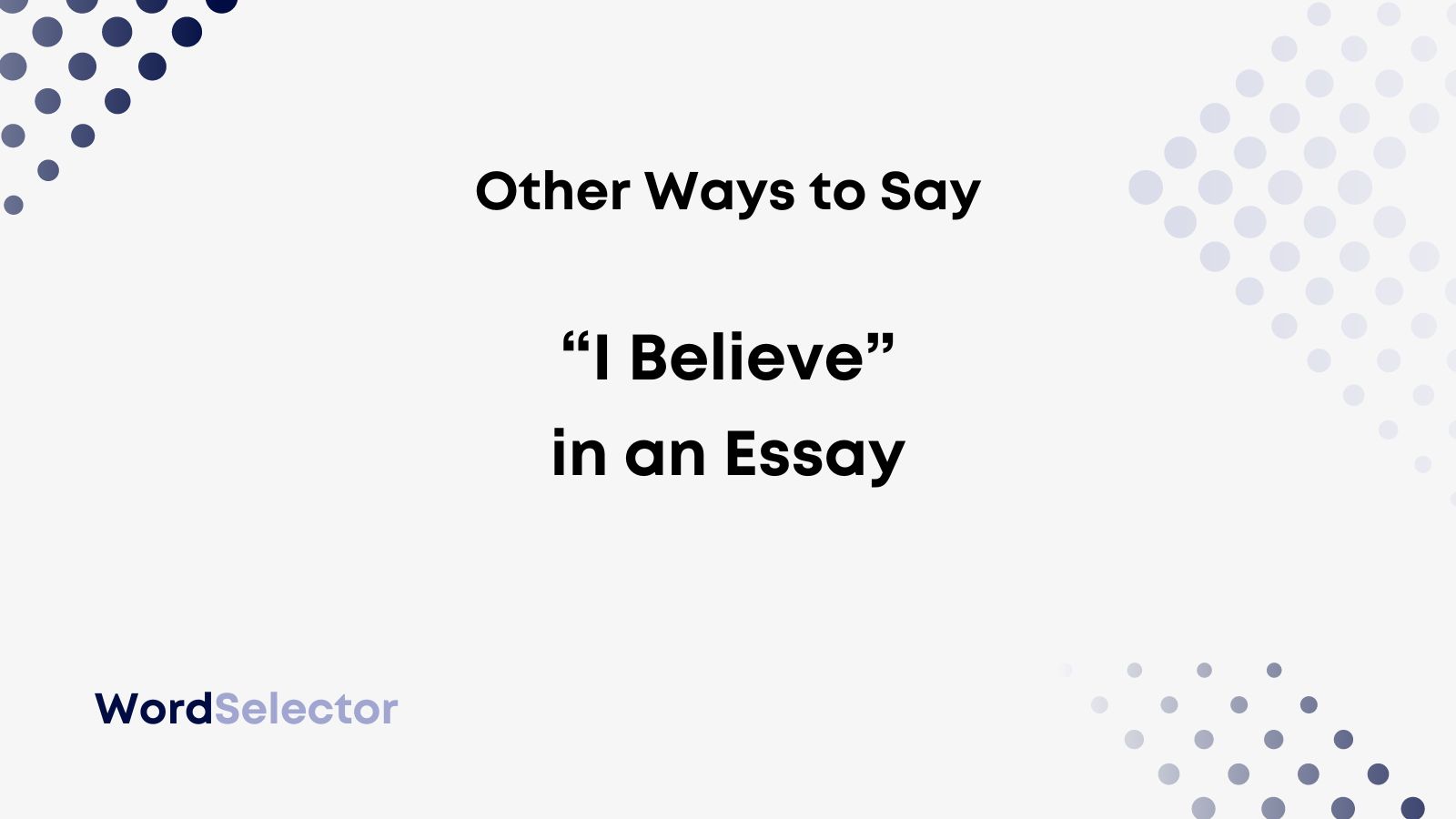
If you’re wondering how to say “I believe” in an essay without using first-person phrasing, you’ve come to the right place!
In this article, we’ve compiled a list of synonyms that you can use instead of saying “I believe” in an essay. We’ll also discuss whether you should use the original phrase at all.
Other Ways to Say “I Believe”
- One might argue
- It would seem
- This suggests
- It is my belief
- As I see it
- From my perspective
- It could be argued
- I would argue
- This illustrates
- This evidences
- In my opinion
- This proves
- In the author’s opinion
KEY TAKEAWAYS
- It’s okay to use “I believe” in an essay if the person grading your paper permits you to use personal pronouns.
- You can say “one might argue” if you want to use a more formal alternative in the third person.
- “It appears” is another good option that removes the personal pronoun “I.”
Don’t go anywhere! In the next section, we’ll discuss two great alternatives for the phrase “I believe” that you can use in your academic writing.
Moreover, we’ll provide some helpful examples and discuss whether it’s a bad idea to use “I believe” in your essay.
One Might Argue
If you’re wondering what to say instead of “I believe” in an essay, a great choice is “one might argue.”
Some academics may view this alternative as superior to the original phrase. After all, it is written in the third person. Therefore, you can get the same point across without using “I.” In some formal academic essays , it is expected by markers that personal pronouns should be avoided.
Additionally, this alternative makes it clear that your statement isn’t certain, just like the original. The word “might” implies that you are expressing an opinion or making just a potential argument.
Finally, let’s see how one might use this phrase in a few examples:
One might argue that the individual responsibility of consumers to buy sustainable products is far less than the responsibility that should be placed on large industries.
Although our findings show that fewer children are taking an interest in mathematics, one might argue that this has more to do with the teaching style of educators rather than the content of the subject itself.
Another way to say “I believe” without using the first person is “it appears.”
Like the original phrase, this one indicates that the statement following it is not certain. In fact, it is simply an observation .
Although this phrase is not necessarily superior to “I believe,” it does remove the personal pronoun “I,” which is often seen as preferable by teachers and professors.
It also has the benefit of using the same number of words as “I believe.” Therefore, it won’t increase your word count , unlike some of the other synonyms on our list.
To see this phrase in action, have a look at the examples below:
It appears that several of the mice in our experiment exhibited empathy when faced with one of their fellows trapped in a cage.
Although Otis Blackwell was a clear stylistic inspiration to Elvis, in addition to being the writer of many of his popular songs, it appears that only a small minority of the public is privy to this truth.
Can I Use “I Believe” in an Essay?
Whether it is okay to use “I believe” in an essay greatly depends on context .
There are some academics and writers out there who think using phrases like “I believe” is bad writing . Firstly, they argue that it is redundant . Obviously, you believe the statement you’re making, or you wouldn’t be making it in the first place!
Secondly, some academics think that personal pronouns should be avoided in academic writing . Therefore, it’s no good to start your statements with “I.”
On the other hand, in recent times, many academics have argued that all forms of education and information should be accessible. This means that everyone should be able to follow and understand them – not just people who were privileged enough to get a university education!
People who hold this opinion say that a phrase like “I believe” is perfectly effective. After all, it lets the reader know that you are expressing an opinion and not a fact. Additionally, it is straightforward and easy for any reader to follow.
Therefore, as a rule of thumb, we would always recommend speaking to the person who is going to grade your essay before you start . If they are a traditionalist and would prefer very formal writing, use one of our alternatives.
If they are happy to read a paper with personal pronouns and straightforward writing in it, go ahead and use “I believe.”
In conclusion, it’s okay to use “I believe” if the person marking your essay is okay with it!
We hope you found this article helpful. If you did, why not bookmark this page so you can come back whenever you like?
- 19 Gender-Neutral Alternatives to “Dear Sir or Madam”
- 16 Other Ways to Say “Looking Forward to Working With You”
- 14 Other Ways to Say “Looking Forward to Meeting You”
- 25 Other Ways to Say “Looking Forward to Being Part of the Team”
We are a team of experienced communication specialists.
Our mission is to help you choose the right phrase or word for your emails and texts.
Choosing the right words shouldn't be your limitation!
© WordSelector

Should I Use “I”?
What this handout is about.
This handout is about determining when to use first person pronouns (“I”, “we,” “me,” “us,” “my,” and “our”) and personal experience in academic writing. “First person” and “personal experience” might sound like two ways of saying the same thing, but first person and personal experience can work in very different ways in your writing. You might choose to use “I” but not make any reference to your individual experiences in a particular paper. Or you might include a brief description of an experience that could help illustrate a point you’re making without ever using the word “I.” So whether or not you should use first person and personal experience are really two separate questions, both of which this handout addresses. It also offers some alternatives if you decide that either “I” or personal experience isn’t appropriate for your project. If you’ve decided that you do want to use one of them, this handout offers some ideas about how to do so effectively, because in many cases using one or the other might strengthen your writing.
Expectations about academic writing
Students often arrive at college with strict lists of writing rules in mind. Often these are rather strict lists of absolutes, including rules both stated and unstated:
- Each essay should have exactly five paragraphs.
- Don’t begin a sentence with “and” or “because.”
- Never include personal opinion.
- Never use “I” in essays.
We get these ideas primarily from teachers and other students. Often these ideas are derived from good advice but have been turned into unnecessarily strict rules in our minds. The problem is that overly strict rules about writing can prevent us, as writers, from being flexible enough to learn to adapt to the writing styles of different fields, ranging from the sciences to the humanities, and different kinds of writing projects, ranging from reviews to research.
So when it suits your purpose as a scholar, you will probably need to break some of the old rules, particularly the rules that prohibit first person pronouns and personal experience. Although there are certainly some instructors who think that these rules should be followed (so it is a good idea to ask directly), many instructors in all kinds of fields are finding reason to depart from these rules. Avoiding “I” can lead to awkwardness and vagueness, whereas using it in your writing can improve style and clarity. Using personal experience, when relevant, can add concreteness and even authority to writing that might otherwise be vague and impersonal. Because college writing situations vary widely in terms of stylistic conventions, tone, audience, and purpose, the trick is deciphering the conventions of your writing context and determining how your purpose and audience affect the way you write. The rest of this handout is devoted to strategies for figuring out when to use “I” and personal experience.
Effective uses of “I”:
In many cases, using the first person pronoun can improve your writing, by offering the following benefits:
- Assertiveness: In some cases you might wish to emphasize agency (who is doing what), as for instance if you need to point out how valuable your particular project is to an academic discipline or to claim your unique perspective or argument.
- Clarity: Because trying to avoid the first person can lead to awkward constructions and vagueness, using the first person can improve your writing style.
- Positioning yourself in the essay: In some projects, you need to explain how your research or ideas build on or depart from the work of others, in which case you’ll need to say “I,” “we,” “my,” or “our”; if you wish to claim some kind of authority on the topic, first person may help you do so.
Deciding whether “I” will help your style
Here is an example of how using the first person can make the writing clearer and more assertive:
Original example:
In studying American popular culture of the 1980s, the question of to what degree materialism was a major characteristic of the cultural milieu was explored.
Better example using first person:
In our study of American popular culture of the 1980s, we explored the degree to which materialism characterized the cultural milieu.
The original example sounds less emphatic and direct than the revised version; using “I” allows the writers to avoid the convoluted construction of the original and clarifies who did what.
Here is an example in which alternatives to the first person would be more appropriate:
As I observed the communication styles of first-year Carolina women, I noticed frequent use of non-verbal cues.
Better example:
A study of the communication styles of first-year Carolina women revealed frequent use of non-verbal cues.
In the original example, using the first person grounds the experience heavily in the writer’s subjective, individual perspective, but the writer’s purpose is to describe a phenomenon that is in fact objective or independent of that perspective. Avoiding the first person here creates the desired impression of an observed phenomenon that could be reproduced and also creates a stronger, clearer statement.
Here’s another example in which an alternative to first person works better:
As I was reading this study of medieval village life, I noticed that social class tended to be clearly defined.
This study of medieval village life reveals that social class tended to be clearly defined.
Although you may run across instructors who find the casual style of the original example refreshing, they are probably rare. The revised version sounds more academic and renders the statement more assertive and direct.
Here’s a final example:
I think that Aristotle’s ethical arguments are logical and readily applicable to contemporary cases, or at least it seems that way to me.
Better example
Aristotle’s ethical arguments are logical and readily applicable to contemporary cases.
In this example, there is no real need to announce that that statement about Aristotle is your thought; this is your paper, so readers will assume that the ideas in it are yours.
Determining whether to use “I” according to the conventions of the academic field
Which fields allow “I”?
The rules for this are changing, so it’s always best to ask your instructor if you’re not sure about using first person. But here are some general guidelines.
Sciences: In the past, scientific writers avoided the use of “I” because scientists often view the first person as interfering with the impression of objectivity and impersonality they are seeking to create. But conventions seem to be changing in some cases—for instance, when a scientific writer is describing a project she is working on or positioning that project within the existing research on the topic. Check with your science instructor to find out whether it’s o.k. to use “I” in their class.
Social Sciences: Some social scientists try to avoid “I” for the same reasons that other scientists do. But first person is becoming more commonly accepted, especially when the writer is describing their project or perspective.
Humanities: Ask your instructor whether you should use “I.” The purpose of writing in the humanities is generally to offer your own analysis of language, ideas, or a work of art. Writers in these fields tend to value assertiveness and to emphasize agency (who’s doing what), so the first person is often—but not always—appropriate. Sometimes writers use the first person in a less effective way, preceding an assertion with “I think,” “I feel,” or “I believe” as if such a phrase could replace a real defense of an argument. While your audience is generally interested in your perspective in the humanities fields, readers do expect you to fully argue, support, and illustrate your assertions. Personal belief or opinion is generally not sufficient in itself; you will need evidence of some kind to convince your reader.
Other writing situations: If you’re writing a speech, use of the first and even the second person (“you”) is generally encouraged because these personal pronouns can create a desirable sense of connection between speaker and listener and can contribute to the sense that the speaker is sincere and involved in the issue. If you’re writing a resume, though, avoid the first person; describe your experience, education, and skills without using a personal pronoun (for example, under “Experience” you might write “Volunteered as a peer counselor”).
A note on the second person “you”:
In situations where your intention is to sound conversational and friendly because it suits your purpose, as it does in this handout intended to offer helpful advice, or in a letter or speech, “you” might help to create just the sense of familiarity you’re after. But in most academic writing situations, “you” sounds overly conversational, as for instance in a claim like “when you read the poem ‘The Wasteland,’ you feel a sense of emptiness.” In this case, the “you” sounds overly conversational. The statement would read better as “The poem ‘The Wasteland’ creates a sense of emptiness.” Academic writers almost always use alternatives to the second person pronoun, such as “one,” “the reader,” or “people.”
Personal experience in academic writing
The question of whether personal experience has a place in academic writing depends on context and purpose. In papers that seek to analyze an objective principle or data as in science papers, or in papers for a field that explicitly tries to minimize the effect of the researcher’s presence such as anthropology, personal experience would probably distract from your purpose. But sometimes you might need to explicitly situate your position as researcher in relation to your subject of study. Or if your purpose is to present your individual response to a work of art, to offer examples of how an idea or theory might apply to life, or to use experience as evidence or a demonstration of an abstract principle, personal experience might have a legitimate role to play in your academic writing. Using personal experience effectively usually means keeping it in the service of your argument, as opposed to letting it become an end in itself or take over the paper.
It’s also usually best to keep your real or hypothetical stories brief, but they can strengthen arguments in need of concrete illustrations or even just a little more vitality.
Here are some examples of effective ways to incorporate personal experience in academic writing:
- Anecdotes: In some cases, brief examples of experiences you’ve had or witnessed may serve as useful illustrations of a point you’re arguing or a theory you’re evaluating. For instance, in philosophical arguments, writers often use a real or hypothetical situation to illustrate abstract ideas and principles.
- References to your own experience can explain your interest in an issue or even help to establish your authority on a topic.
- Some specific writing situations, such as application essays, explicitly call for discussion of personal experience.
Here are some suggestions about including personal experience in writing for specific fields:
Philosophy: In philosophical writing, your purpose is generally to reconstruct or evaluate an existing argument, and/or to generate your own. Sometimes, doing this effectively may involve offering a hypothetical example or an illustration. In these cases, you might find that inventing or recounting a scenario that you’ve experienced or witnessed could help demonstrate your point. Personal experience can play a very useful role in your philosophy papers, as long as you always explain to the reader how the experience is related to your argument. (See our handout on writing in philosophy for more information.)
Religion: Religion courses might seem like a place where personal experience would be welcomed. But most religion courses take a cultural, historical, or textual approach, and these generally require objectivity and impersonality. So although you probably have very strong beliefs or powerful experiences in this area that might motivate your interest in the field, they shouldn’t supplant scholarly analysis. But ask your instructor, as it is possible that they are interested in your personal experiences with religion, especially in less formal assignments such as response papers. (See our handout on writing in religious studies for more information.)
Literature, Music, Fine Arts, and Film: Writing projects in these fields can sometimes benefit from the inclusion of personal experience, as long as it isn’t tangential. For instance, your annoyance over your roommate’s habits might not add much to an analysis of “Citizen Kane.” However, if you’re writing about Ridley Scott’s treatment of relationships between women in the movie “Thelma and Louise,” some reference your own observations about these relationships might be relevant if it adds to your analysis of the film. Personal experience can be especially appropriate in a response paper, or in any kind of assignment that asks about your experience of the work as a reader or viewer. Some film and literature scholars are interested in how a film or literary text is received by different audiences, so a discussion of how a particular viewer or reader experiences or identifies with the piece would probably be appropriate. (See our handouts on writing about fiction , art history , and drama for more information.)
Women’s Studies: Women’s Studies classes tend to be taught from a feminist perspective, a perspective which is generally interested in the ways in which individuals experience gender roles. So personal experience can often serve as evidence for your analytical and argumentative papers in this field. This field is also one in which you might be asked to keep a journal, a kind of writing that requires you to apply theoretical concepts to your experiences.
History: If you’re analyzing a historical period or issue, personal experience is less likely to advance your purpose of objectivity. However, some kinds of historical scholarship do involve the exploration of personal histories. So although you might not be referencing your own experience, you might very well be discussing other people’s experiences as illustrations of their historical contexts. (See our handout on writing in history for more information.)
Sciences: Because the primary purpose is to study data and fixed principles in an objective way, personal experience is less likely to have a place in this kind of writing. Often, as in a lab report, your goal is to describe observations in such a way that a reader could duplicate the experiment, so the less extra information, the better. Of course, if you’re working in the social sciences, case studies—accounts of the personal experiences of other people—are a crucial part of your scholarship. (See our handout on writing in the sciences for more information.)
You may reproduce it for non-commercial use if you use the entire handout and attribute the source: The Writing Center, University of North Carolina at Chapel Hill
Make a Gift

11 Other Ways To Say “I Think” And “I Believe” In An Essay
It can be tempting to say “I think” or “I believe” in an essay, especially when writing a personal narrative or opinion-based essay. The issue with this phrase is they tend to read as informal and weak. This article will explore some stronger alternatives that are worth considering.
What Can I Say Instead Of “I Think” And “I Believe”?
There are many different ways to express that what you’re saying is an opinion or a conclusion you have drawn using stronger wording than “I think” and “I believe.” Here are some options:
- In my opinion
- It could be argued
- Many believe
- This suggests
- It can be concluded
- It makes sense
- This proves
- This supports the idea
- X makes a strong case
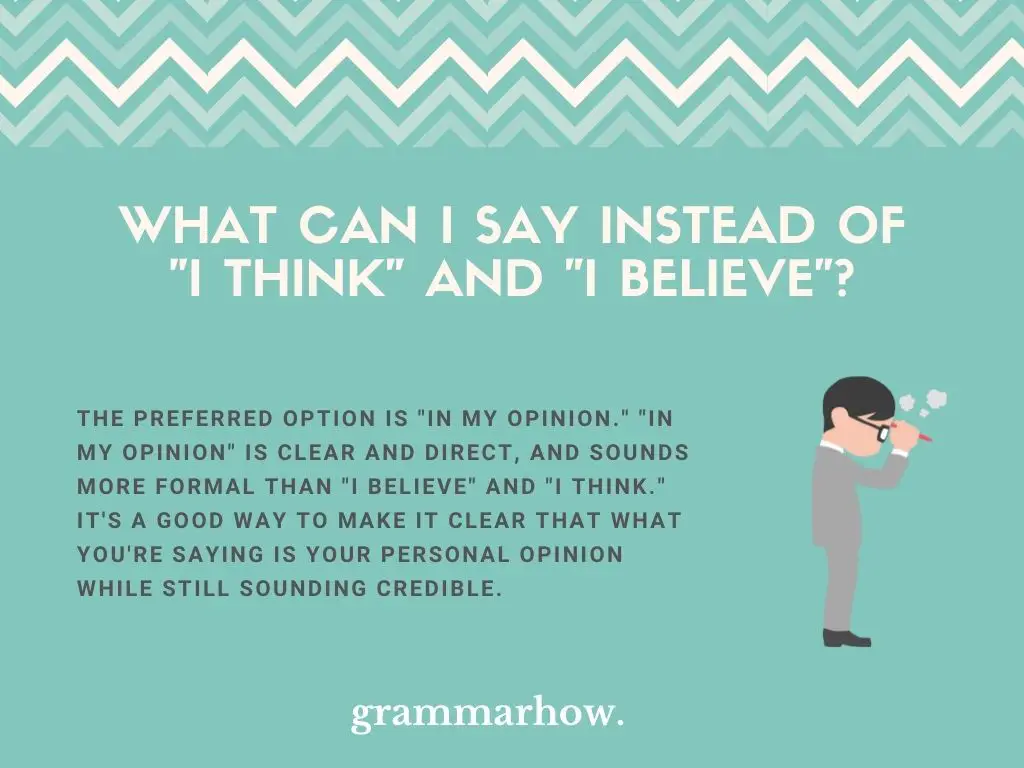
The preferred option is “in my opinion.” “In my opinion” is clear and direct, and sounds more formal than “I believe” and “I think.” It’s a good way to make it clear that what you’re saying is your personal opinion while still sounding credible.
In My Opinion
“In my opinion” is a good choice when you’re writing a first-person essay. “Opinion” implies more fact-based consideration than “believe” and more depth than “think.” “Opinion” also comes off as more confident than both “think” and “believe.”
“In my opinion” sounds formal enough to be appropriate in an essay, but can still maintain the conversational tone that is typically expected in first-person essays.
Here’s what “in my opinion” looks like in context:
- In my opinion, every public school student should be offered a free lunch option.
- Reading through this book was challenging not for the content but for the dull writing style. In my opinion, it shouldn’t be upheld as a classic.
- In my opinion, neither argument was particularly convincing.
It Could Be Argued
This sort of hypothetical phrasing isn’t always considered strong, but “it could be argued” is still a solid choice for third-person essays that require you to explore various arguments.
“It could be argued” is useful when you need to analyze multiple arguments or look at something from multiple angles. It allows you to point out some arguments or thoughts people might have in general to develop your argument.
Here are some ways you can use “it could be argued”:
- It could be argued that teaching Shakespeare in school only serves to confuse students due to the extremely antiquated language.
- It could be argued that the color blue represents sadness, but there are many examples in the text that point to blue instead representing loneliness.
- The bird could be a representation of her fear. Conversely, it could be argued that the bird is there simply because the lead character loves birds.
Many Believe
“Many believe” is useful when you want to discuss widely held beliefs and the fact that these beliefs are widely held is common knowledge. You can also use “many believe” when you have a statistic to back up the claim.
“Many believe” is better than “I think” and “I believe” in those sorts of situations because it creates a less personal statement. That helps it feel more formal and makes the argument feel more expansive.
Here’s how you can use “many believe”:
- Many believe that eating any kind of fat is unhealthy, but nutritionists disagree.
- According to the poll, many believe that doing yoga and drinking enough water will cure certain mental illnesses.
This Suggests
“This suggests” is a great choice for drawing a conclusion based on the evidence you’ve presented. It’s stronger than “I think” and “I believe” because it explicitly ties your ideas to other ideas.
You’ll typically use “this suggests” after presenting some evidence or an argument. “This suggests” introduces your analysis and often your argument.
For example:
- The flowers in the vase didn’t die until after Ashley fought with her mother. This suggests that the state of the perpetually near-death flowers was serving as a metaphor for the state of Ashley’s relationship with her mother.
- Jodi’s favorite color was green. This suggests some part of her was tied to everything green represented in the novel, even if she denied it.
It Can Be Concluded
“It can be concluded” is a good replacement for “I think” and “I believe” in third-person writing. It emphasizes the conclusions you’re drawing based on previously detailed evidence.
Like “this suggests,” “it can be concluded” comes after you present some evidence or ideas. It directly connects your thinking to the evidence, which supports a strong argument.
Here are some examples:
- As such, it can be concluded that the core message of the story is the real reward was the friendships we made on the journey.
- It can be concluded that he never knew what happened to his father and was simply making up different versions of the story as the subject was too difficult for him to discuss directly.
It Makes Sense
“It makes sense” is a phrase can use to introduce a thought or insight you have. It’s subtly persuasive and can fit into both formal and informal essay styles.
“It makes sense” is deceptively strong wording. While it may seem soft at first, it can be used to make some really strong statements.
Here’s how that could look in practice:
- It makes sense that the school wouldn’t provide free lunches for students. It’s a costly plan, and the school district has a long track record of investing in administration before investing in student welfare.
- It makes sense that the play’s love story ended tragically. The playwright was newly divorced when she penned it, and her poetry from this time shows a similar disillusionment with romantic relationships.
This Proves
“This proves” is a strong way to connect your conclusions and arguments to previously presented evidence. This phrase is a good choice when you’re confident in your evidence and your argument, as using it after shaky evidence can harm your credibility.
Here’s what this might look like in context:
- The students who got more recess time did better on tests than children who had more quiet study time. This proves that children need more playtime throughout the day.
- This proves my original hypothesis, though not in the way I expected.
This Supports The Idea
This is another useful phrase for directly tying previously stated evidence to your arguments and conclusions. Once you provide your evidence, you can go into your argument by saying “this supports the idea that…”
“This supports the idea” is a deeply academic phrase. It doesn’t come off too strong, nor does it read as personal or informal. It reads as objective, which can support your credibility in the eyes of the reader.
Here are some examples:
- Lisa ultimately gave the flower to Joan. This supports the idea that the flower was representative of trust.
- In this scene, the characters’ loyalties are made clear by where they are standing in relation to the protagonist. John is standing next to the protagonist. This supports the idea that, despite what he says, he truly was loyal to the protagonist.
X Makes A Strong Case
“X makes a strong case” is a phrase when you want to specifically tie in an argument someone else has made. It emphasizes the person who made the argument rather than what you think about the argument.
For example, if you wanted to say “I think Rodney is right about the dress code,” a stronger way to word that in an essay would be “Rodney makes a strong case about the dress code.”
Both sentences communicate that you think Rodney’s argument has merit, but using the “X makes a strong case” format emphasizes Rodney’s arguments rather than your evaluation of them.
This less-personal writing is generally considered to be more formal and thus more appropriate for academic writing.
Here are some more examples of how to use this phrase:
- The author makes a strong case in favor of the motion.
- In the novel, Susie’s father makes a strong case against the idea of Susie marrying a stranger.
“In my mind” is a strong phrase that is perfect for first-person narrative essays. It’s engaging, conversational wording that still maintains the formality expected in essays.
“In my mind” is a good way to word more personally held thoughts and beliefs without saying “I think” or “I believe.”
Here are some ways you could use “in my mind”:
- In my mind, nothing mattered more than the championship.
- In my mind, there was no way any of this could have a good outcome. I just didn’t see how it would work out.
Sometimes the best alternative to “I believe” and “I think” is simply to cut the phrase without providing a replacement. This makes your writing more succinct and straightforward and less informal.
Replacing “I think” and “I believe” can support the style and flow of your writing, but deleting the lead-in entirely is common advice. The argument is that since you wrote the essay, “I think” and “I believe” are implied. It’s redundant to include them.
Take a look at these sentences:
- I think the power outage was caused by the wind storm.
- I believe students should have mentors throughout their time in school.
Here’s what they look like if you remove the lead-in:
- The power outage was caused by the wind storm.
- Students should have mentors throughout their time in school.
In these instances, removing the phrases entirely without replacing them made for stronger statements.

Martin holds a Master’s degree in Finance and International Business. He has six years of experience in professional communication with clients, executives, and colleagues. Furthermore, he has teaching experience from Aarhus University. Martin has been featured as an expert in communication and teaching on Forbes and Shopify. Read more about Martin here .
- 10 Better Ways To Write “In This Essay, I Will…”
- 9 Other Ways To Say “In My Opinion” (Formal & Friendly)
- 10 Other Ways to Say “I Am” in an Essay
- Can An Opinion Be Wrong Or Right? Full Explanation
The Link Between the Resurrection and Elections
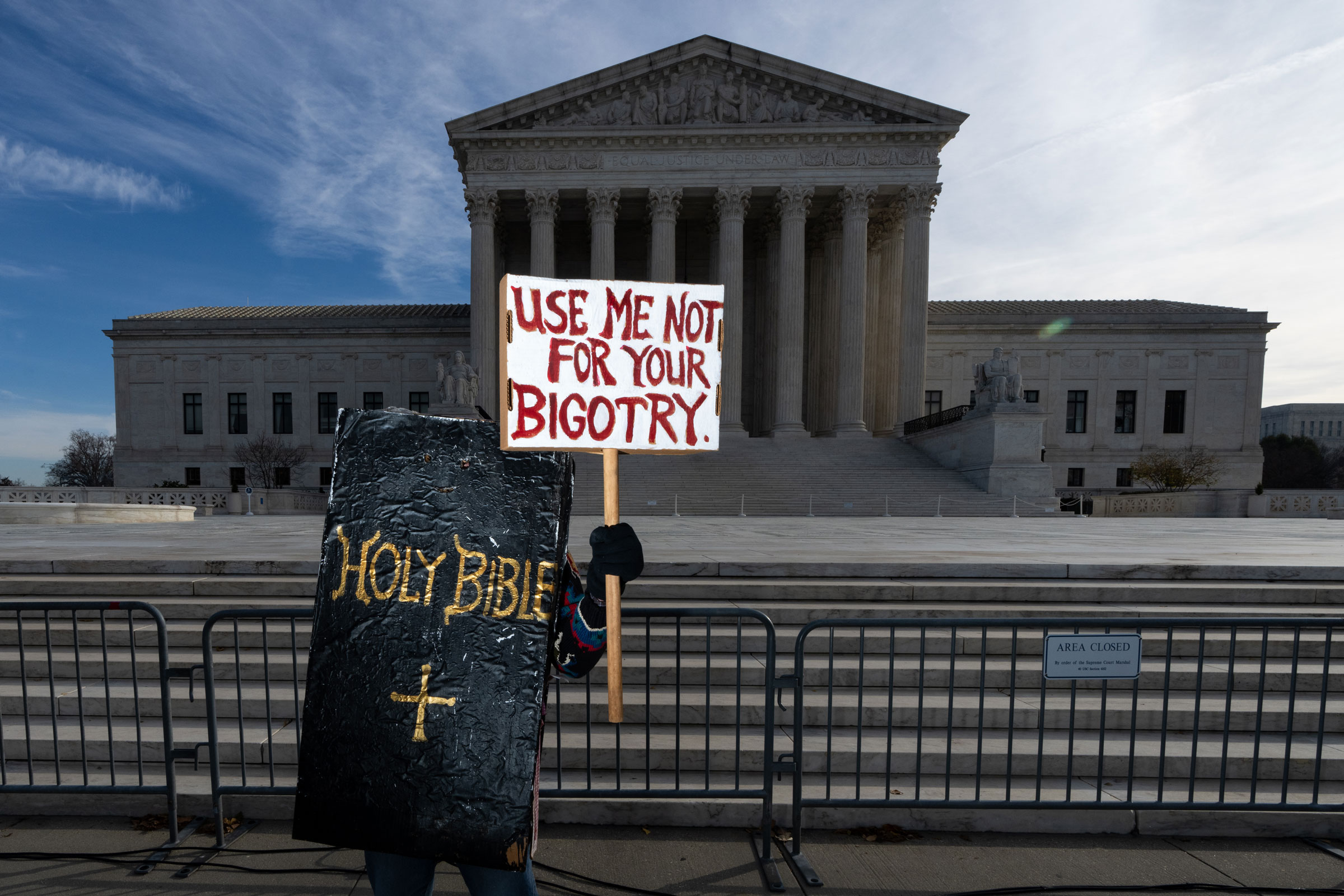
I went to a funeral recently. It was an old friend and former colleague . The big "C," diagnosed six years ago. He outlived the first diagnosis by five years but eventually it caught up. Splendid service, lovely music, fine sermon, many poignant moments. I met dozens of people I hadn’t seen for years. All as it should be.
Except for one thing. The service was billed as a "resurrection" celebration. The printed service paper said so. The preacher said so. Some of the hymns said so. But the resurrection itself—a new bodily life in God’s eventual new creation—was conspicuous by its all-but-absence. And that’s a problem. Not only because most people in our culture don’t know what "resurrection" means , but because they don’t know why it matters .
Resurrection matters because what you ultimately hope for affects the person you are right now. More particularly, it matters because people who really believe in resurrection have a different approach to all of life—including politics. Including issues of justice and mercy, at all levels. Including, dare I say, voting and elections. This affects all of us.
Read More: The Hidden History of Those Who Wrote the Christian Story
So what does "resurrection" mean? Most people today assume that it’s a fancy way of saying "life after death." That’s certainly what I would have picked up from that funeral service. But "resurrection" never meant "life after death," or "going to heaven." Plenty of people in Jesus’ day believed in "life after death," in some form, but were still shocked by talk of "resurrection." That’s because "resurrection" always meant people who had been physically dead coming back to a new life—a new bodily life. Whatever we might mean by "life after death" (the Bible actually says very little about that), "resurrection" is a further stage. It’s life after "life after death." Wherever Jesus was after his horrible death, he wasn’t raised again until the third day. "Resurrection" is the final stage in a two-stage post-mortem journey. With that, a new world is born, full of possibilities.
Jesus’ risen body was the first element in God’s long-promised "new creation." A little bit of God’s new world, coming forward from the ultimate future into our surprised and unready present time. And launching the project of new creation that continues to this day.
Most people in our world, including most churchgoers, have never heard this explained. This robs us, as individuals, of our ultimate hope, leaving us with "pie in the sky when you die," which was never the original Christian vision. In particular, it robs us of the motivation to work for God’s new creation in the present. And that means public life—justice, politics, voting—and all that goes with them.
Read More: The Bible’s Most Misunderstood Verse
Here's the point: Jesus’ resurrection doesn’t mean, "He’s gone to heaven, so we can go there too" (though you might be forgiven for thinking it meant that, granted the many sermons both at funerals and at Easter). It means, "In Jesus, God has launched his plan to remake creation as a whole, and if you are a follower of Jesus you get to be part of that right now." What God did for Jesus, close up and personal, is what he plans to do for the whole world. And the project is already under way.
How does this work? One way of putting it is to say that God intends to put the whole world right in the end. This will be a great act of total new creation, for which Jesus’ resurrection is the advance model. In the present time, though, God puts people right—women, men, children—by bringing them to faith in Jesus and shaping their lives by his spirit. And he does this so that they can, here and now, become "putting-right" people for the world. In the future, God will put the world right; in the present, God does put people right.
And the "put-right" people are called to be "putting-right" people, Sermon-on-the-Mount people, lovers of justice and peace, in and for God’s world. They are to be signs of the new creation which began with Jesus’ resurrection. They are to produce, here and now, further signs of that new world. The church as a whole, and every member, is called to become a small working model of new creation.
And that new creation includes (what we call) social reform. Check out the relevant biblical passages. The Psalms sketch the ideal society: in Psalm 72, the No.1 priority for God’s chosen king is to look after the weak, the poor and the helpless. The prophets add their dramatic pictures, as in Isaiah 11 where the wolf and the lamb will lie down together. (They tried that in a zoo in California, and it worked fine provided they put in a new lamb each day.) Already in Jesus’ day some Jewish teachers were interpreting Isaiah’s picture of the peaceable world in terms of warring nations finding reconciliation. Jesus announced that the time had come for this new way of peace. St Paul picked up that theme, seeing the church as, by definition, a multicultural, multi-ethnic society, without social class or gender hierarchy, as a sign and foretaste of the coming new creation of justice and peace.
The tragedy in the western churches is that, by misunderstanding "resurrection," both the "conservatives" and the "liberals" have robbed themselves of the whole message. The conservatives, eager to tell people how to go to heaven, regard any attempt to improve the present world as a distraction, not realizing that with Jesus’ resurrection the new creation has already been launched. The liberals, having long been taught that science has disproved Jesus’ resurrection, dismiss its importance and pursue their own vision of social improvement.
Hence the unholy stand-off: liberal Christians saying "justice and peace" but denying resurrection; conservative Christians saying "resurrection" but meaning "going to heaven." The problem is that trying to get the result (social justice) without the resource (Jesus’ resurrection) is building on sand. Just as a "heaven " that is not "a new creation" is vacuous (and unbiblical), a liberal agenda that is not rooted in the resurrection is rudderless. The 18th-century Enlightenment tried that experiment (reform without resurrection), and it clearly hasn’t worked. No: it is because God raised Jesus from the dead that ultimate new creation is promised, and present new creation becomes possible.
A true understanding of new creation, instead, starts with the Easter message about Jesus’ new bodily life, and the powerful gift of his spirit. It flows out into creative, healing, and restorative work in God’s world—including, of course, political and public life. That insight slices through our present culture wars, where bits of half-remembered "religion" get muddled up with bits of half-understood "politics." It’s time to reset the terms, both of debate and of action. Get resurrection right and political priorities, including wise voting, will rearrange themselves.
That is the hope. And, in the New Testament, "hope" doesn’t mean "optimism" or "always look on the bright side." It means Jesus.
More Must-Reads From TIME
- Jane Fonda Champions Climate Action for Every Generation
- Biden’s Campaign Is In Trouble. Will the Turnaround Plan Work?
- Why We're Spending So Much Money Now
- The Financial Influencers Women Actually Want to Listen To
- Breaker Sunny Choi Is Heading to Paris
- Why TV Can’t Stop Making Silly Shows About Lady Journalists
- The Case for Wearing Shoes in the House
- Want Weekly Recs on What to Watch, Read, and More? Sign Up for Worth Your Time
Contact us at [email protected]
You May Also Like

IMAGES
VIDEO
COMMENTS
I believe in saving for a rainy day. I believe in investing in oneself. I believe in the saying, "money doesn't grow on trees.". I believe that rich people should be forced to pay more taxes. These 50 I Believe essay topics are sure to inspire your own original beliefs and help you create a powerful and unique essay.
This I Believe is a popular essay genre that allows the writer to share a personal belief and, through a narrative, explain that belief's origin or a time that belief was put into action. The essay genre started in the 1950s on a radio show with Edward R. Murrow and was continued by NPR in 2004.
This I Believe is an international organization engaging people in writing and sharing essays describing the core values that guide their daily lives. Over 125,000 of these essays, written by people from all walks of life, have been archived here on our website, heard on public radio, chronicled through our books, and featured in weekly ...
A This I Believe essay is a written composition that encapsulates an individual's personal beliefs, values, and philosophies. Often reflective and intimate in nature, these essays offer readers insight into the author's subjective understanding of the world. They provide an opportunity to explore the depth of one's convictions, making use ...
believe, not what you don't believe. Avoid statements of religious dogma, preaching, or editorializing. Be personal: Make your essay about you; speak in the first person. Try reading your essay aloud to yourself several times, and each time edit it and simplify it until you find the words, tone, and story that truly echo your belief and the way
This I Believe is an exciting media project that invites individuals from all walks of life to write about and discuss the core beliefs that guide their daily lives. They share these statements in weekly broadcasts on NPR's Morning Edition and All Things Considered. The series is based on the 1950's radio program This I Believe, hosted by ...
Explore. Featured Essays Essays on the Radio; Special Features; 1950s Essays Essays From the 1950s Series; Browse by Theme Browse Essays By Theme Use this feature to browse through the tens of thousands of essays that have been submitted to This I Believe. Select a theme to see a listing of essays that address the selected theme. The number to the right of each theme indicates how many essays ...
To help you get started, we are going to list 22 hot this I believe essay ideas for you. Go ahead and pick the one you prefer or tweak them to suit your preference. I believe in having a lot of fun in and out of school. I believe in using a mentor to build a career. I believe in using advanced technology for learning.
Here's the prompt I used: This I Believe. For 2 minutes: List words or ideas that you think about when you think of YOUR LIFE. (Can be feelings, symbols, names, events, etc.) After students generated this list, I asked them to consider what they wanted to write about and share with others.
This I Believe Beginning in 1951, radio pioneer Edward R. Murrow asked Americans from all walks of life to write essays about their most fundamental and closely held beliefs. Half a century later ...
Body. Paragraph one - Introduce your first point on the "this I believe" paper. Paragraph two - One should create a paragraph about what they have learned from the belief. Paragraph three - Explain the application of the specific idea in one's personal life in the future.
This was the time when I remembered the words of my grandmother "only fools rush […] Art and Creativity to Solve Problems. I believe that art is the deepest expression of the society and the beliefs it underscores. I believe in the unity of the human race and bringing an end to racism and human trafficking. We will write.
Power Lesson: "This I Believe" Essays In this power lesson shared by high school English teacher Cynthia Ruiz, students write their own personal statements of belief. The essay pushes students to write about something that matters to them and helps them get to know each other on a deeper level.
What I Believe. ( from: Forster, E.M. Two Cheers for Democracy) I do not believe in Belief. But this is an Age of Faith, and there. are so many militant creeds that, in self-defence, one has to. formulate a creed of one's own. Tolerance, good temper and. sympathy are no longer enough in a world which is rent by.
A "This I Believe" essay is a personal reflection on the writer's life, their influences, and what motivates them. It is a time for the author to take stock of their thoughts and inform readers of their thoughts, feelings, and motivations. These essays can reveal a person's life passages, extraordinary moments, and inspirations.
In an academic essay, these phrases will probably be too informal because they are too personal. "In my opinion, + [your sentence]" In my opinion, a good education is more important than a good car. "I believe that + [your sentence]" I believe that schools should encourage students to walk or cycle to school rather than drive.
Essay What I Believe. I believe in logic. I believe in reason. Specifically, I apply this logic to a major choice in my life, that of religion. When someone asks you what your beliefs are, what's the first thing you think of? For most people, religious orientation is the first thing that comes to mind. I have to say, this is the first thing ...
It Appears. Another way to say "I believe" without using the first person is "it appears.". Like the original phrase, this one indicates that the statement following it is not certain. In fact, it is simply an observation. Although this phrase is not necessarily superior to "I believe," it does remove the personal pronoun "I ...
Each essay should have exactly five paragraphs. Don't begin a sentence with "and" or "because.". Never include personal opinion. Never use "I" in essays. We get these ideas primarily from teachers and other students. Often these ideas are derived from good advice but have been turned into unnecessarily strict rules in our minds.
From where I stand, this is the best course of action. Therefore, I think we should capitalize on it. 2. My Take Is. For a more direct alternative, you can write "my take is.". It's another way to say "I believe" in an essay. Saying you have a "take" suggests you believe something that others might not.
This essay throws light on his personality. Summary. E. M. Forster begins 'What I Believe' with a note of clean confession. He does not believe in Belief. Most of the creeds are militant. The world is full of religious or racial persecution. He admits that Faith is a mental starch.
Here are some options: The preferred option is "in my opinion." "In my opinion" is clear and direct, and sounds more formal than "I believe" and "I think.". It's a good way to make it clear that what you're saying is your personal opinion while still sounding credible.
Resurrection matters because what you ultimately hope for affects the person you are right now. More particularly, it matters because people who really believe in resurrection have a different ...
Images: AP/Bloomberg News Composite: Mark Kelly. Friday's terrorist attack at the Crocus City Hall concert venue near Moscow killed more than 100 people in a brutal crime against humanity. Many ...
A massive cargo ship plowed into Baltimore's Francis Scott Key Bridge early Tuesday, causing the 1.6-mile structure to crumble like a pile of toothpicks - plunging cars and people into the ...
Explore. Featured Essays Essays on the Radio; Special Features; 1950s Essays Essays From the 1950s Series; Browse by Theme Browse Essays By Theme Use this feature to browse through the tens of thousands of essays that have been submitted to This I Believe. Select a theme to see a listing of essays that address the selected theme. The number to the right of each theme indicates how many essays ...
The Christian narrative culminates in the creation of the Kingdom (and family) of God, a transnational community united by faith and mutual love. Roman Catholics, Anglicans and Orthodox Christians ...